UNIVERSITY OF SAN FRANCISCO SCHOOL OF LAW • FALL 2025
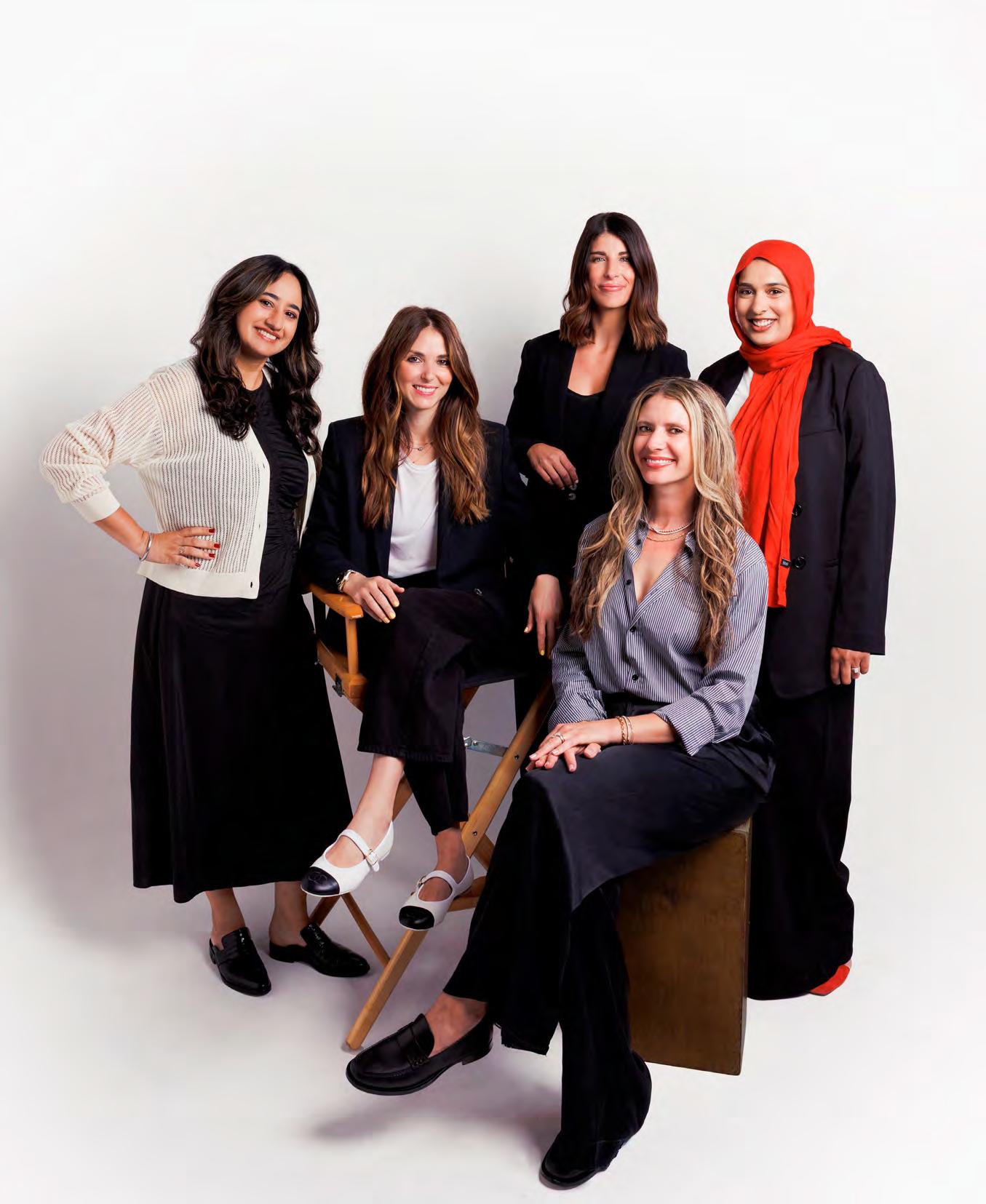

UNIVERSITY OF SAN FRANCISCO SCHOOL OF LAW • FALL 2025

FIVE USF LAW ALUMNAE DESCRIBE WHAT IT’S LIKE TO LEAD AT NETFLIX | PAGE 12
Dear Alumni and Friends,
It’s hard to believe more than a year has passed since I joined the USF Law community as dean. I have loved getting to know many of you and sharing in your pride and passion for our school.
In this issue of USF Lawyer, you’ll read about the ways we are preparing our students for transformations in the practice of law and in society at large. From teaching our first-year students to use generative AI in legal research and writing to launching new certificates focused on emerging technology and privacy, we’re equipping our graduates to meet this exciting and challenging moment.
We are also doubling down on our dedication to instilling in our students the values and skills that technology cannot replace. Through our law clinics, including the Immigration and Deportation Defense Clinic (page 22), we build the commitment to service that is core to our profession. Through our nationally recognized moot court and trial advocacy programs, our students develop the confidence and communication skills to succeed in the courtroom and beyond.
Our faculty and staff both preserve our distinguished legacy and fuel our vision. I’m thrilled to welcome several new professors to our ranks (meet two of them on page 9).
This year, we also celebrated the legacies of three dedicated teachers and mentors who are leaving
us for well-earned retirement. Professor Edith Ho, Professor Carol Wilson, and Julianne Cartwright Traylor have left an indelible impact, and I know they’ll remain a vital part of our community (read more about their contributions on pages 8, 11, & 26).
This issue of USF Lawyer is full of stories that speak to our shared purpose: training lawyers to think boldly, act with integrity, and serve the greater good; I hope you’ll find inspiration in these pages and pride in being part of this community.
Warmly,
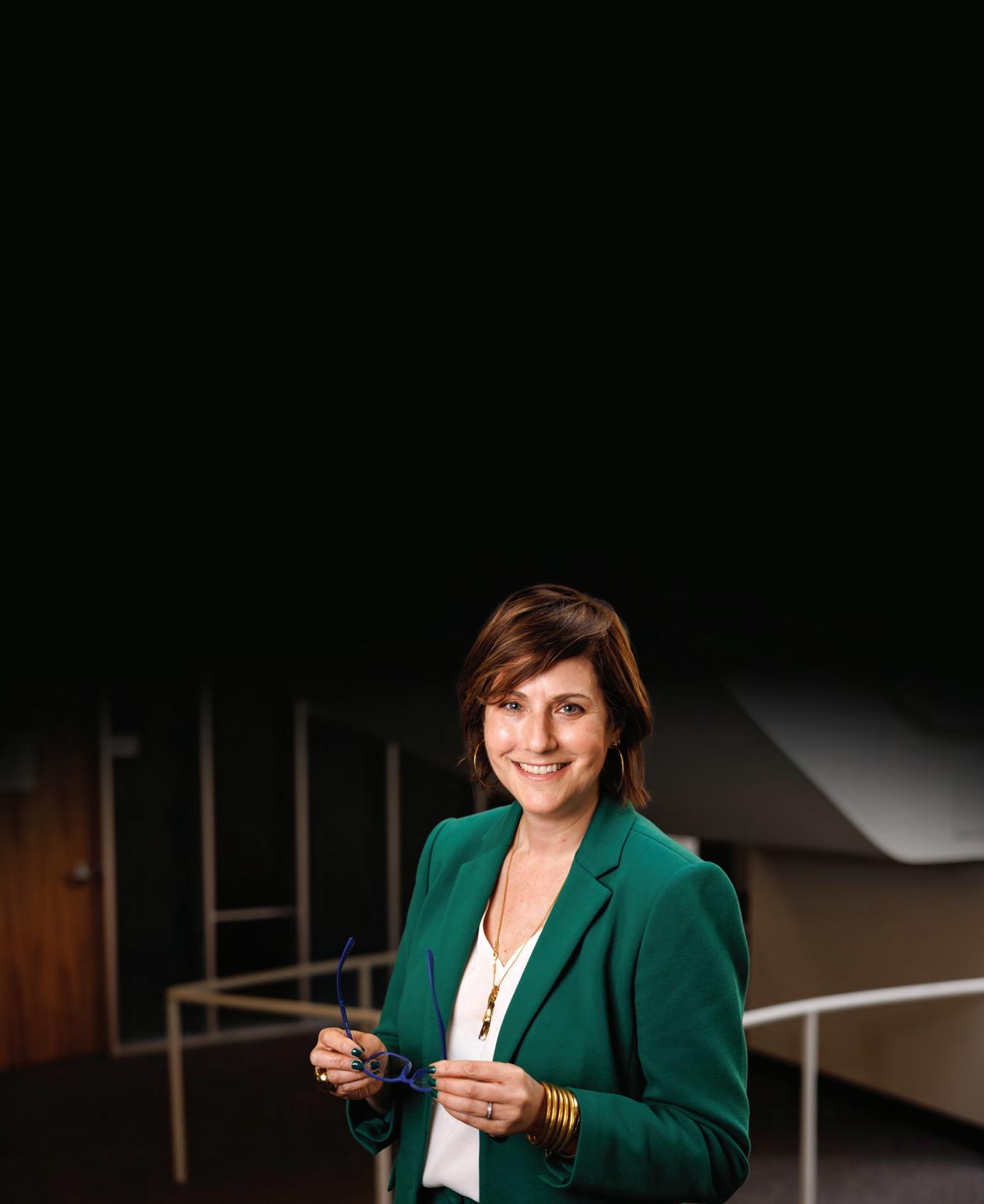
SHELLI
Johanna Kalb Dean and Professor of Law
12
STREAMING’S DREAM TEAM
Five USF Law alumnae describe what it’s like to lead at Netflix.
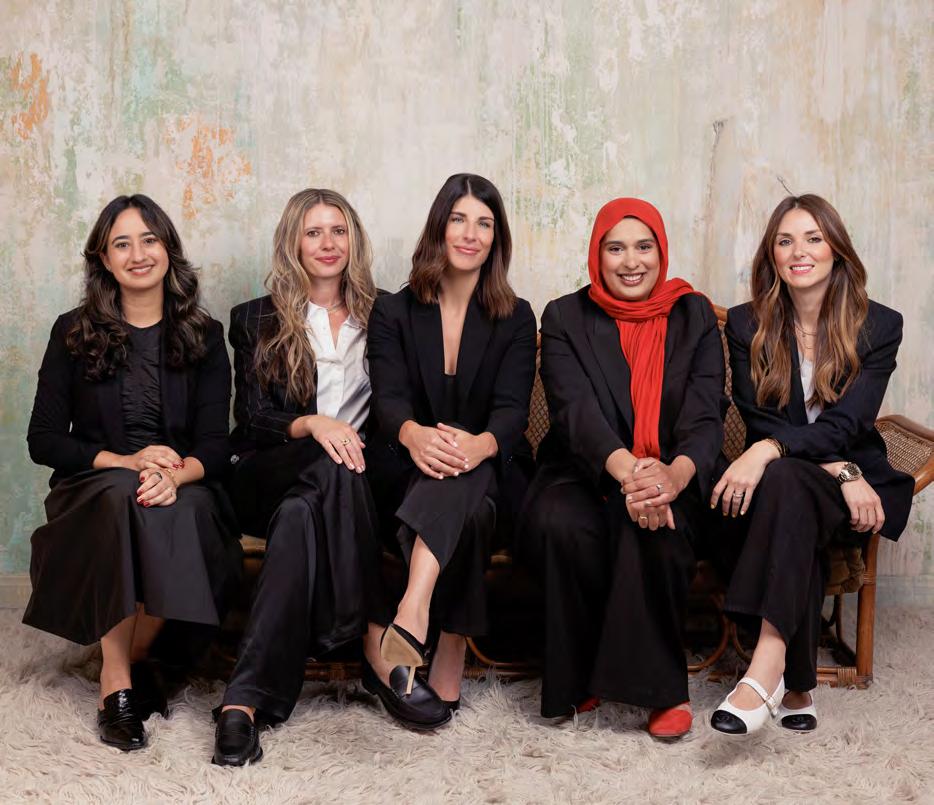
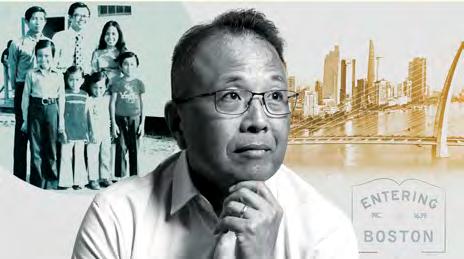
18 22
FROM REFUGEE TO RAINMAKER
Alumnus Chin Pham ‘90 brings grit and good humor to his work and to his life.
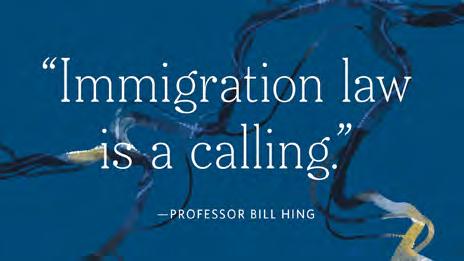
USF’S IMMIGRATION AND DEPORTATION DEFENSE CLINIC
Ten years of trust, compassion, and advocating for justice.
2 IN BRIEF
Bringing Innovation Full Circle
Lighting the Way Miyana Leggett ’26 is One to Watch From Seoul to San Francisco and Back Again Exploring Name, Image, Likeness
9 FACULTY FOCUS
Heart and Help: Carol Wilson Retires Catching Up with New Faculty Teaching With Purpose
26
ALUMNI NEWS Class Notes A Global Legacy Welcoming New Board Members The Real Work of Lawyering
32 CLOSING ARGUMENT Wielding Hope By Shounak Dharap ’16
ON THE COVER: Alumnae
When first-year law students arrived at USF Law last year, they found something new woven into their required Legal Research, Writing, and Analysis (LRWA) program: generative artificial intelligence (genAI).
The first law school in the country to embed genAI into the core curriculum, USF Law teaches students to practice with emerging technologies, including drafting legal memos, refining arguments, and practicing oral advocacy. Students learn to compare AI-generated research results with traditional methods, evaluate errors in logic and clarity, and discuss where genAI does and does not fit in legal work.
“This is not a separate course or one-off training,” said Professors Megan Hutchinson and Nicole Phillips ‘15, LRWA program co-directors and Center for Law, Tech, and Social Good affiliated faculty. “We’ve built genAI into the
curriculum from the start, because it’s already part of how legal work happens.”
“We’re giving students early exposure to the tools and the questions that are shaping modern legal practice.”
Last month, the law school began partnering with AI companies Anthropic and Accordance to expand its curricular integration. In Evidence and Professional Responsibility (required upper-division courses), as well as electives, including Negotiation, Employment Law, and tax law courses, students are using Large Language Models to work on real-world legal tasks like analyzing claims and defenses and identifying evidentiary gaps to inform discovery.
They’re also figuring out the risks of relying on emerging technologies, including inaccuracies and bias. And in the process, they’re tackling questions that often don’t have easy answers.
“In class, we’ve explored how we can use AI to support our research process, to make our legal writing more effective, to develop the judgment to know when and how to use it ethically, and as a resource to practice our oral argument skills,” said Ruth Alcantara ‘27. “I felt prepared to go into my summer job knowing how to work with these constantly changing tools.”
“By embedding genAI into learning outcomes, we’re giving students early exposure to the tools and the questions that are shaping modern legal practice,” said Hutchinson and Phillips. “The emphasis is not just on how to use AI, but on how to assess it, question it, and use it with care.”
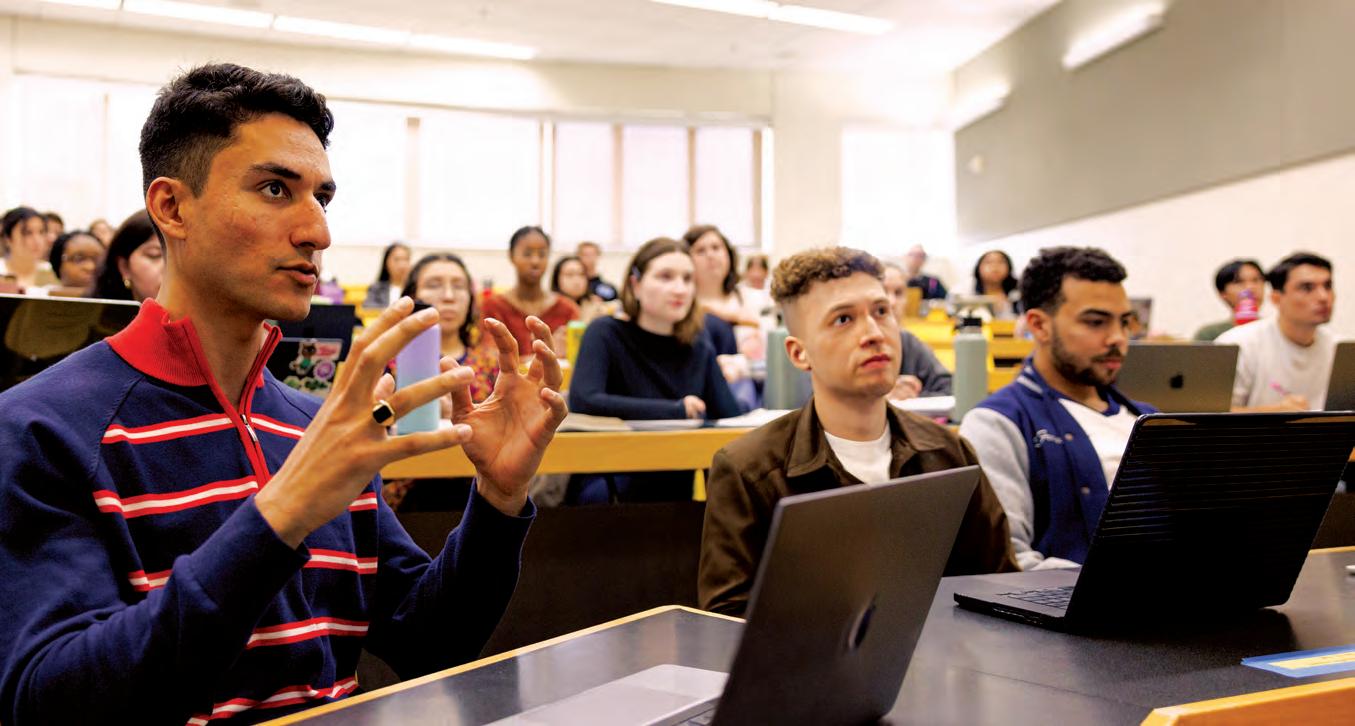
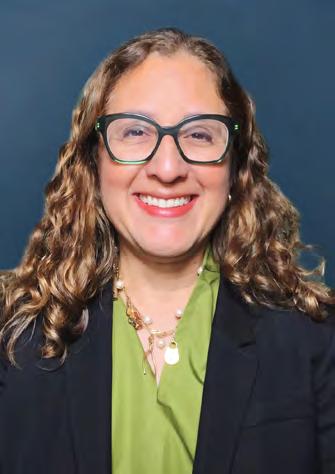
Lydia Flocchini ’98 didn’t set out to work in legal tech. As a law student, she discovered the power of digital tools in conducting research, and she’s never looked back. Today, with a distinguished career in legal tech, Flocchini has returned to support USF as a volunteer advisor to the Center for Law, Tech, and Social Good.
“I got an email from the Center, and the timing felt almost serendipitous,” she recalls. “Dean Kalb has this bold vision, and I was transitioning to working as an advisor with early-stage legal tech startups. It all just clicked. I immediately thought, ‘The Center is like a startup for good.’”
That startup mindset is something Flocchini knows well. Her fascination with legal technology began during her 1L year, when she worked as a student representative for Westlaw. She quickly became an expert in digital research, helping peers and faculty navigate emerging online tools.
“I loved it,” she says. “It made the legal research process faster and more powerful. I remember thinking, this is going to change everything.”
That early interest turned into a dynamic career. Flocchini spent 14 years at Thomson Reuters, working first with law schools in the Bay Area, then leading sales and account management for global law firms based on the West Coast, and ultimately, the brand and marketing strategy for WestlawNext, the nextgeneration legal research platform. She then joined the pioneering legal analytics startup Lex Machina, defining what “customer success” could mean in a legal tech context.
Today, Flocchini advises legal tech companies across the country, drawing on her deep experience in go-to-market strategy, product development, and customer engagement. But her work with the Center brings a different kind of fulfillment. As an advisor, Flocchini helps amplify the Center’s impact by supporting strategy and philanthropic outreach.
“I see it like pro bono work,” she says. “The Center’s mission and focus on AI, blockchain, access to justice, and training the next generation of lawyers perfectly align with everything I care about. And it’s deeply connected to the values I associate with USF: purpose, equity, innovation, and doing good for others.”
Flocchini believes today’s students have opportunities she never imagined. “When I was in law school, no one talked about legal tech careers. Now there are endless possibilities.”
For Flocchini, staying involved is both personal and professional. “I wouldn’t be where I am today without this law school,” she says. “The professors, the support, the mission—it shaped me. As a firstgeneration Latina law grad, I felt seen and supported. USF created space for students like me to thrive. Giving back isn’t just something I do. It’s who I am. It’s a core value.”
lighting the way:
Together with faculty, family, and friends, the USF Law Class of 2025 gathered in St. Ignatius Church on May 17 to mark their law school graduation. The Honorable Benjamin T. Reyes II ’92 served as commencement speaker and delivered a clear charge to graduates: use your law degree to pursue justice, serve others, and protect the truth.
Judge Reyes wove personal reflection with professional conviction, drawing on his journey from an immigrant family to his current role on the Contra Costa County Superior Court bench. He reminded graduates that their degrees come with responsibility.
“You will face moments when doing what’s right comes with a cost—professionally or personally,” he said. “But you must stand firm. In the face of injustice or indifference, be the voice for those who have none.”
Throughout his address, Judge Reyes returned to the metaphor of fire. Drawing on the Jesuit motto Ite inflammate omnia—“Go, set the world on fire”—he told graduates that their legal careers must be powered by three essential elements: the heat of their ambition, the fuel of their training, and the oxygen of community.
Representing the graduating class, in her address, Lindsey Hom ’25 invited her fellow graduates to reflect on their law school years and expressed gratitude for their collective journey. Quoting Justice Thurgood Marshall, Hom reminded the Class of 2025 that while the legal system can force open doors, it can’t build bridges. “That job belongs to you and me.”
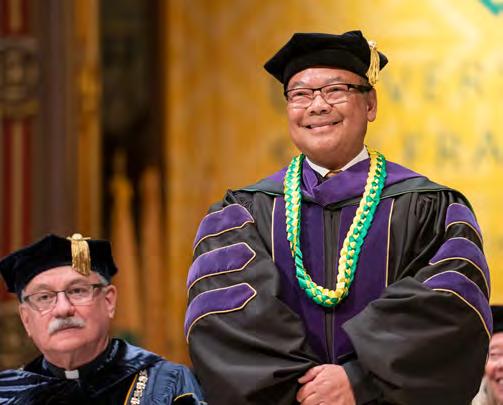
It’s no surprise to anyone who knows her that Miyana “Mimi” Leggett ’26 was named “Most Likely to Brighten Your Day” by the Student Bar Association. Born in Shreveport, Louisiana, and raised in Arizona and the Bay Area, Leggett has a passion for animals. As an undergrad, she had originally majored in veterinary medicine before pivoting to political science at Auburn University. The standout third-year student balances a full course load with leadership roles in student organizations, including the Street Law Student Association (she was co-president in 2024-2025) and the Moot Court Program, where she serves as Competition Teams Director. An aspiring intellectual property attorney, Leggett was part of the winning team at the prestigious Saul Lefkowitz Western Regional Moot Court Competition, earning both first place overall and best oral argument. She credits her mother, Jataesha Crump, for being her greatest cheerleader and advocate—from throwing a surprise party upon her admission to USF Law, to serving as a sounding board for outlines, and playing judge as Leggett prepped for moot court arguments.
You were originally planning on working with animals. Why pivot and pursue a law degree?
It has always been important to me to make a positive impact on the lives of those around me. The reward of helping someone through one of their worst moments, or simply assisting someone in creating their best moments, is what inspired me to pursue law school.
Why did you choose USF Law for law school?
I chose USF after touring the campus. The school was beautiful, but what impressed me most was the welcoming community and the clear commitment of the administration and faculty to their students. I knew I would love it here!
Which class has challenged you the most?
Constitutional law proved to be my most demanding class. As doctrine evolves with each court and era, the rules often shift in unexpected ways. Detailed case charts were key to my success in this class.
What was a highlight of your work with the Street Law Student Association?
In Street Law, we developed clear, engaging legal lessons and taught them to K-12 students in under-resourced schools, as well as to adult community organizations, helping people understand their rights. One highlight was when students from Cesar Chavez Community School took a field trip from Woodland, California, to USF Law to attend our lesson on Fourth Amendment protections.
How do you plan to use your law degree?
I plan to practice intellectual property law to protect and amplify the voices of creators. By safeguarding people’s ideas and guiding them through licensing, branding, and enforcement, I hope to help people contribute to their communities through their creations.
What is the best way to de-stressas a law student?
I destress by taking my dog, Princess, on hikes or to the dog park. It’s a great way to soak up the sun and escape into nature. ■
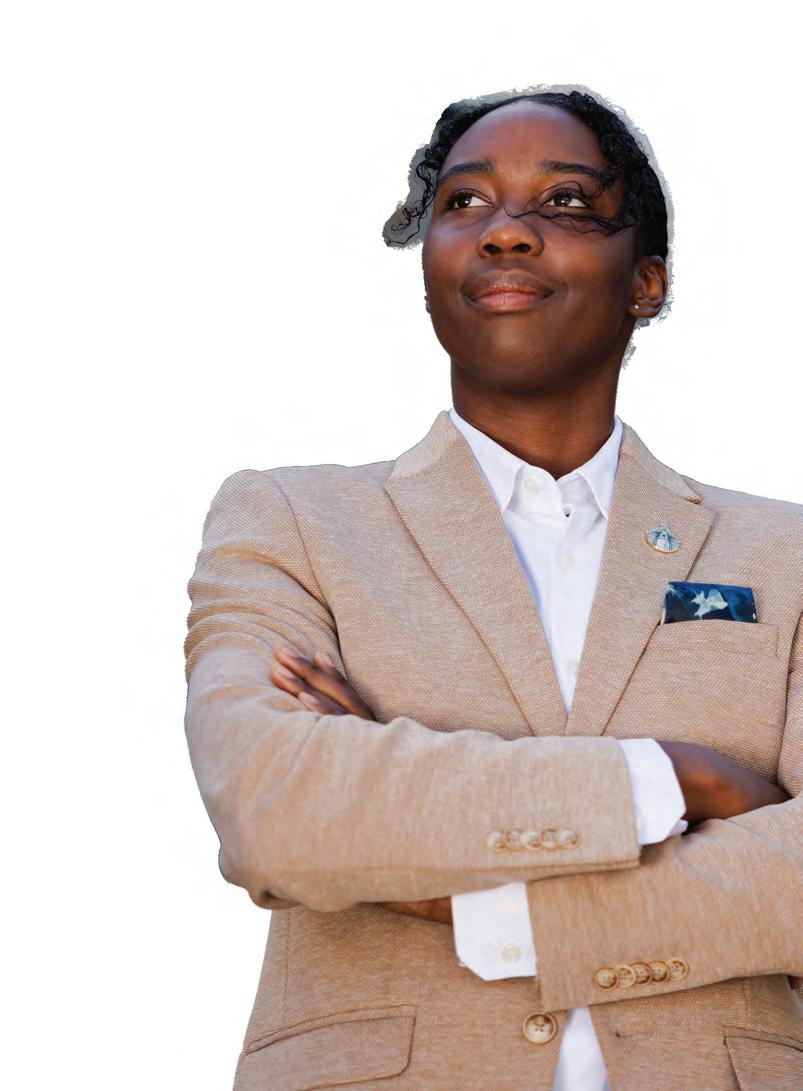
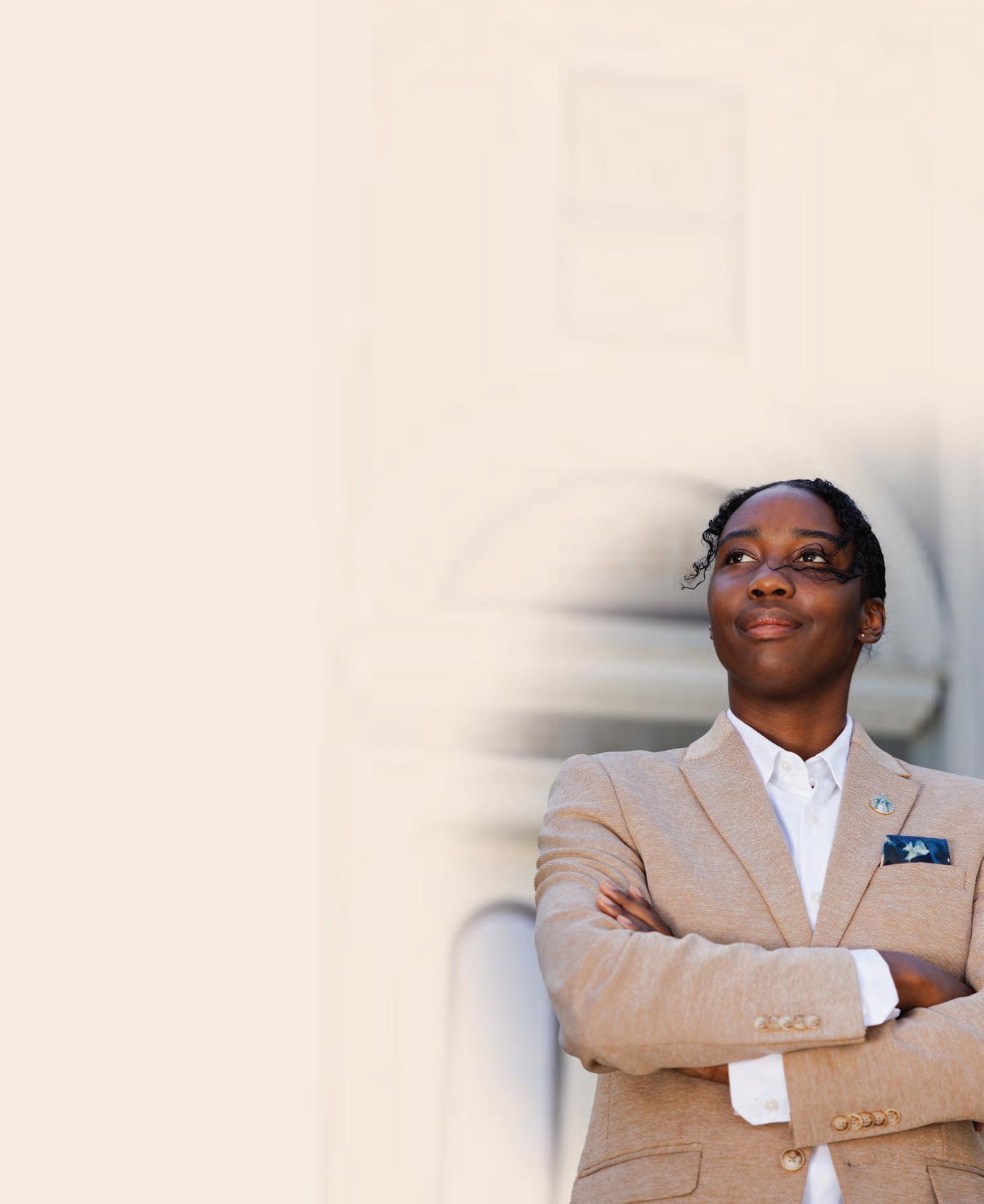
“ T he students are not out of status just because their visa is revoked… Only an immigration judge can order removal.”
Professor Bill Ong Hing told the San Francisco Chronicle about changes in visa policies impacting Bay Area university students.
“ M ost states’ laws offer [child influencers] financial protections. But the privacy protections, allowing children to delete content made without their authorization… hopefully Utah sets a precedent.”
Professor Tiffany Li spoke with CBS News about Utah’s new law protecting child influencers.
“ T he administration’s pause on green card processing undermines our domestic and international legal obligations to ensure that those fleeing persecution, torture, and harm would never again be turned away from our shores.”
Professor Lindsay M. Harris argued against the government’s pause on applications for refugees and asylees in an op-ed published in The Hill
“ W hen rehabilitated prisoners are deprived of a hard-won second chance, we all lose.”
Professor Lara Bazelon , Director of the Racial Justice Clinic, wrote about the shift away from progressive prosecutors during last year’s elections in an article she authored for New York Magazine
“Congress should establish a Tech Court. This specialized court would enable increased judicial training on the technical aspects of cases concerning artificial intelligence, blockchain technology, and other issues.”
Professor Michele Neitz wrote in a letter to the Editor published in The New York Times
“ Police-induced false confessions are a leading cause of wrongful conviction of the innocent.”
Professor Richard Leo spoke with the Los Angeles Times about police practices known to produce false confessions by innocent people.
“ States have the power to continue to pass regulations and conduct enforcement actions in ways that are designed to remedy imbalances in environmental harms.”
Professor Alice Kaswan discussed potential environmental justice efforts in light of federal rollbacks during an interview with Bloomberg.
When Daniel Won Zo Lee ‘83 arrived in the United States in 1977, he didn’t envision a legal career that would span continents, courtrooms, and corporate boardrooms. Now, decades later, as the Country Managing Partner of DLA Piper Korea, the major global law firm, he looks back on an unexpected journey shaped by hard work, big decisions, and the support of mentors.
Born and raised in Korea, Lee came to the U.S. following his father’s move to the Bay Area. “My original plan was to earn a PhD and return to teach at my alma mater,” he recalls. That goal brought him to Michigan State University, where he earned a master’s degree in Communications. But while studying in the U.S., a new realization took hold: to thrive in his adopted country, he needed a professional license. Law, he decided, was the path that made sense.
He enrolled at USF School of Law, drawn by its proximity to his family in Concord and by the school’s openness to international students like him. “USF was very generous to me,” he says. “My English wasn’t great, and legal language was like another foreign language. So I studied harder than I ever had before.”
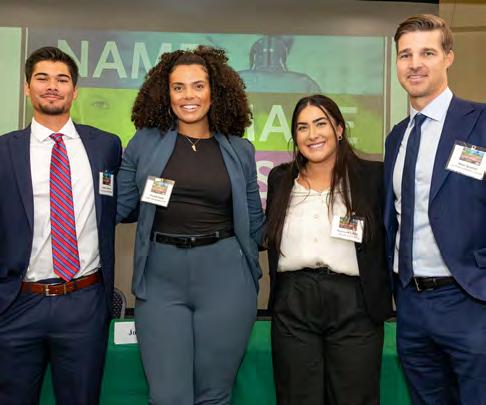
He credits the law school’s Academic Support Program (ASP), including a kind third-year tutor, and faculty members like Jack Garvey and Delos Putz, who brought the law to life, particularly in constitutional law and contracts, for shaping his early legal thinking.
“Coming from a country under dictatorship, reading U.S. Supreme Court decisions was eye-opening. I was mesmerized by the reasoning in those opinions.”
After graduation, Lee began his legal career in Los Angeles, serving Korean American clients in civil litigation before joining Hawaii’s largest law firm. There, he gained extensive courtroom experience and later shifted into transactional work. The next chapter of his career brought him to major international firms, where he represented Korean conglomerates in cross-border matters.
Eventually, destiny—and a personal decision—led him back to Korea. While on a business trip to New York, he stepped into a cathedral to pray about whether to return to Korea with his soon-to-be wife, who would go back shortly for her work. That same day, he received a call from a headhunter: IBM was hiring a general counsel for Korea.
He got the job.
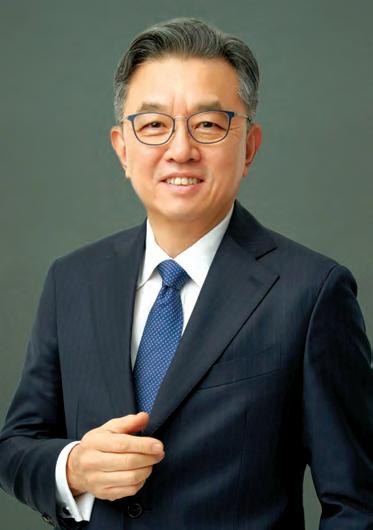
“That was destiny,” he says. “And that’s how I got married and moved back to Korea.”
Today, his practice includes advising major Korean companies—Samsung, LG, Hyundai, and others—on outbound M&A, international arbitration, and foreign direct investment. “One day I’m in D.C., the next I’m in Tokyo,” he says. “Every day is different, and that’s what I love about being a lawyer.”
Looking back, he’s quick to share the guiding principle that helped him succeed across borders and languages: the “three D’s”—Desire, Dedication, and Discipline. “You have to want something, be willing to dedicate yourself to it, and have the discipline to follow through,” he says. “That’s what I would tell any law student starting out.”
Last year, in collaboration with the U.S. Patent and Trademark Office (USPTO), USF Law hosted a daylong event examining the evolution of name, image, and likeness (NIL) laws for student-athletes.
The conference’s keynote speaker, California State Senator Nancy Skinner, author of Senate Bill 206, the Fair Pay to Play Act, underscored the transformative impact of NIL rights. Before SB 206, Skinner explained, “College athletes were the only people in the U.S. who didn’t have rights to their name, image, or likeness.” She emphasized that student-athletes are the driving force behind a multibillion-dollar industry and deserve fair compensation, adding, “The revenue generated is from the work and the talent of the student-athletes. They are the labor.”
The conference also featured alumni Matthew Quinlan ‘04 and Katrina Garry ‘25, and USF Law students Stephanie Cohen ‘26 and Joseph Soberon ‘26.
/usflaw
Stay connected with USF School of Law on social media. Tag your posts to share your #USFLaw moments!
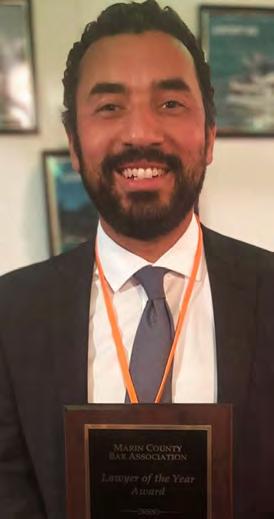
For his tireless dedication to the legal community and to the office’s clients, alumnus David Sutton ‘08, Marin County Public Defender, has been named Lawyer of the Year by the Marin County Bar Association. Congratulations, David, on this well-deserved recognition!
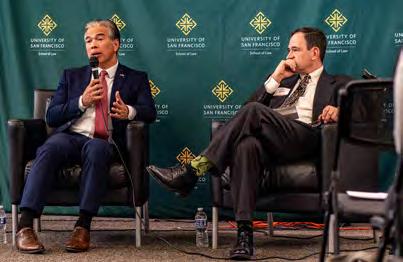
We had the honor of welcoming California Attorney General Rob Bonta to #USFLaw for an evening hosted by the USF Prosecutors Alliance, in collaboration with PILF, Pilipino American Law Society, Criminal Law Society, and the Prosecutors Alliance. AG Bonta shared his journey to law school and his extraordinary career in public service.
Photo credit: Samantha Hutz
Together with partner orgs, the Racial Justice Clinic team, including Professors Lara Bazelon, Belle Yan, Charlie Nelson Keever, and Gabby King, were awarded the M. Shanara Gilbert Human Rights Award for their efforts to implement the CA Racial Justice Act.
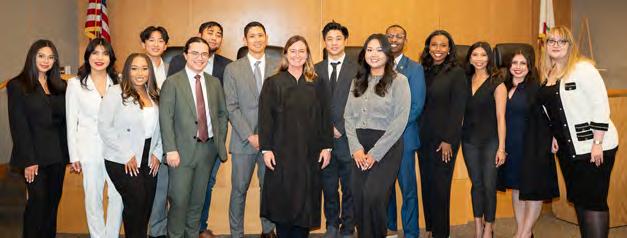
@usflaw
@usflaw
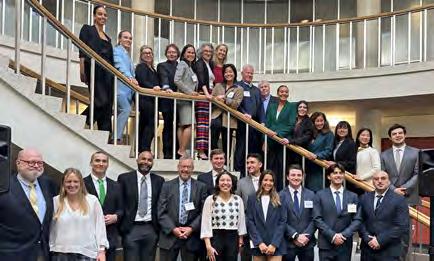
Week two of the Intensive Advocacy Program (IAP) is underway! Students are diving into hands-on training in every aspect of #TrialAdvocacy, guided by some of the most accomplished litigators and judges in the field. Wishing a successful second week to our #futurelawyers, and extending a heartfelt thank you to our expert faculty, led by Doris Cheng ’98.
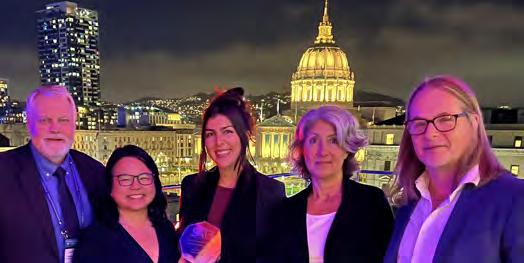
Congratulations to the newest members of the California Bar! February bar examinees were sworn in during a ceremony led by San Francisco Superior Court Judge Anne Costin ‘08. 92% of the Class of 2024 have successfully passed the bar, and we’re so proud of our newest #USFLaw lawyers. Can’t wait to see the impact they’ll have as attorneys.
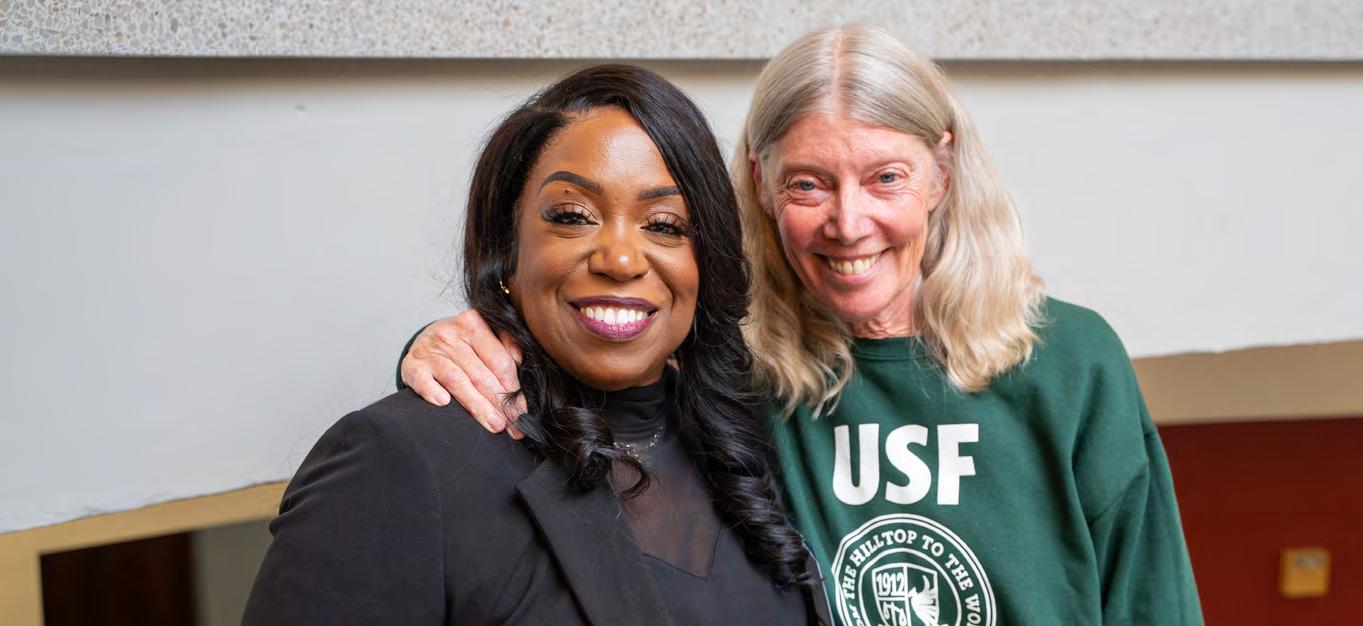
When Assistant Professor Carol Wilson ’88 reflects on her 35 years at USF Law, one lesson stands out above all: “The biggest thing I’ve learned is how to see the world through other people’s eyes,” she says. “It’s been by far the greatest education I’ve had in my life, and I couldn’t have imagined a better career. I have truly loved ASP all these years.”
Wilson, who retired this summer as co-director of the Academic Support Program (ASP), graduated from USF Law in 1988 and practiced attorney malpractice defense with Long & Levit before returning to USF in 1990. Drawn by her meaningful experience as an ASP tutor during her third year of law school, and with a background in teaching English as a Second Language, Wilson knew early on that teaching was where she belonged.
She quickly discovered that her work at ASP would involve much more than academic support. “I was terrified the first few years because I assumed my job was purely to help students with the academic side,” she recalls. “I rapidly learned that academic support doesn’t work unless you deal with the
whole person. So I wear a million hats. One day, I’m a counselor. The next, a financial advisor. I’ve babysat. I’ve taken care of pets. I’ve celebrated with people.”
Over the decades, Wilson became a steady, empathetic presence for generations of students, helping them navigate not only the rigors of law school but also the life challenges that inevitably arose.
“Carol Wilson’s unwavering support from the moment I met her was transformative,” recalls Judge Nichelle Holmes ’10. “Through her encouragement, dedication, and belief in my potential, she reinforced the confidence I carried with me and helped me grow into the lawyer and judge I aspired to become.”
come in and cry—that’s week three. But ASP keeps you on your toes because you never know what’s going to come through your door.”
Among her many contributions, Wilson introduced ASP’s annual “family night,” an initiative designed to help students’ families understand the intense demands of law school.
“ O ne day, I’m a counselor. The next, a financial advisor. I’ve babysat. I’ve taken care of pets. I’ve celebrated with people.”
“Life doesn’t stop because you go to law school,” she explains. “But families don’t always realize how much pressure students are under. Family night helped bridge that gap, giving students an opportunity to bring everybody on board.”
Wilson has seen the rhythms of the law school year repeat with remarkable consistency. “I’ve relived the first year of law school 36 times, including my own,” she says, smiling. “I know all the ups and downs. I can predict when people will
As she steps away from her role, Wilson is looking forward to the next chapter. “Number one, I’m going to take a big trip,” she says.
“Number two, I’m going to adopt a rescue dog. And number three: I’m going to goof around and give the dog a really good life.”
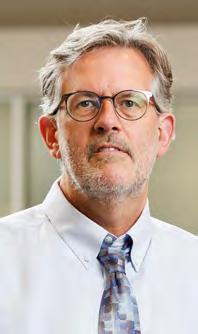
PROFESSOR GEORGE BACH
After spending the 2023–2024 academic year as a visiting professor at USF Law, Professor George Bach returned to campus this fall as a full-time member of the faculty, teaching Constitutional Law, Evidence, and Civil Procedure.
What or who inspired you to pursue a career in law— and eventually, in higher ed?
I’ve always had a desire to do public interest work. Certainly, being a member of the LGBTQ+ community was a big part of it. I also had the great fortune to work for firms that represented labor unions and that did civil rights work before I joined the ACLU as an attorney. I had so many amazing mentors who led me to teaching, including Prof. Barbara Bergman (now at Arizona), who asked me to teach as an adjunct, which started me down this path.
What drew you to USF?
USF cares about its students and teaching. It cares about training lawyers to serve their communities. Being a part of that mission is truly exciting.
What’s one piece of advice you give your students that you wish someone had told you in law school?
In my experience, happiness as a lawyer is inversely proportional to how much you are focused on making money. Try to keep your expenses low and follow your heart, not your wallet.
Favorite book (legal or otherwise)?
Hemingway’s For Whom the Bell Tolls . I confess I spent too much time reading it during my 1L year and even attempted (emphasis on “attempted”) to write a paper in my Jurisprudence course on it.
What’s your go-to way to unwind after a long day of teaching or writing?
Walking my crazy dog! And swimming.
What’s a hobby or skill you’ve picked up recently?
A good friend taught me to play cribbage this year.
What’s something your students or colleagues might be surprised to learn about you?
I was an Eagle Scout!
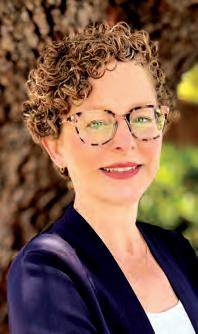
PROFESSOR ALLISON BROWNELL TIRRES
A legal scholar with expertise in constitutional law, property law, immigration, and civil rights, Professor Allison Brownell Tirres joined USF Law from DePaul University College of Law. Her recent research focuses on noncitizen civil rights in both historical and contemporary perspectives.
Why pursue a career in the legal field?
My parents have always inspired me with their dedication to education, public service, and the common good. I was the first in my family to attend law school, thanks in large part to their encouragement.
Why did you choose to focus on legal history?
On the one hand, I have studied it out of sheer enjoyment: I love learning about the past and trying to make sense of different times and places. Working in historical archives is endlessly fascinating to me. I also focus on it for more practical reasons: knowing history is vital for making sense of our present moment and for pursuing the kind of change we want to see in the world.
What’s something your students or colleagues might be surprised to learn about you?
I was raised in Birmingham, Alabama, and can’t escape being an Alabama football fan. Also, I’ve lived abroad in Japan, Mexico, and the Dominican Republic.
If you weren’t a law professor, what would you be doing?
Art museum curator or national park ranger.
Favorite book (legal or otherwise)?
It’s impossible for me to name one favorite book, but some more recent contenders would be Cloud Atlas by David Mitchell, Hold Still by Sally Mann, My Life on the Road by Gloria Steinem, and The Underground Railroad by Colson Whitehead. Books that were particularly influential on me as a student include Let Us Now Praise Famous Men by James Agee and Walker Evans, No Constitutional Right to Be Ladies by Linda Kerber, The Alchemy of Race and Rights by Patricia Williams, and Impossible Subjects by Mae Ngai.
From courtrooms to classrooms, and from global conferences to national news, USF Law faculty are shaping conversations and driving change. Over the past year, they’ve earned prestigious awards, delivered lectures around the world, and shared their expertise in high-impact media outlets. Through scholarship, advocacy, and public engagement, they continue to tackle some of the most pressing legal and societal challenges of our time. Here are a few recent highlights of their accomplishments:
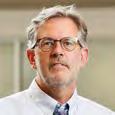
Professor George Bach
Published “The Federal Government Cannot Prohibit the Exercise of a Core State Sovereign Function: Haaland v. Brackeen and Expanding the Anticommandeering Doctrine” in the UC Law Constitutional Quarterly
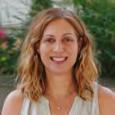
Professor Lara Bazelon
Co-authored with Belle Yan and Beth Redbird, “Ground Rules: Giving Meaning and Effect to Key Contested Terms in the California Racial Justice Act,” published in the Santa Clara Law Review
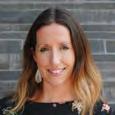
Associate Professor Jacqueline Brown
Published “Fact Finding is an Immigration Lawyer’s Job: The Importance of Working One on One with Clients in Asylum Cases” in the University of San Francisco School of Law Review and “A New Opportunity To Reformulate The Definition Of A Particular Social Group Post Chevron” in St. Thomas University, Intercultural Human Rights Law Review
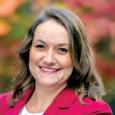
Professor Lindsay M. Harris
Published her co-authored article, “Afghan Allies in Limbo: Discrimination in the U.S. Immigration Response,” in the San Diego Law Review. Co-authored and published a book chapter in The Oxford Handbook of ChildCentered Approaches to Migrant Children
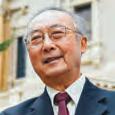
Associate Dean for Faculty Scholarship
Bill Ong Hing
Published “Black Migrants and Black Lives Matter: Voices of Tension, Racism, Pan-Africanism, and Prospects for Collaboration” in UC Law Journal of Race and Economic Justice
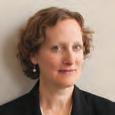
Professor Alice Kaswan
Published “Governing Grants” in the Ohio State Law Journal and “Rebates or Planning Grants?”— a white paper—for Georgetown Climate Center.
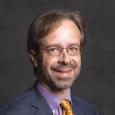
Professor Richard Leo
Received the Henry F. Fradella Award from the Western Society of Criminology for significant contributions to empirical scholarship on the legal aspects of criminal justice. Wrote and co-authored numerous scholarly articles, including “PoliceInduced Confessions, 2.0: Risk Factors and Recommendations,” published in Law and Human Behavior.
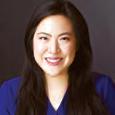
Associate Professor Tiffany Li Wrote and published numerous scholarly articles, including: “State Constitutional Rights to Privacy,” Georgia Law Review (forthcoming, 2025); “Privacy and Disinformation,” UC Law Journal (forthcoming, 2025); and “Ending the AI Race: Regulatory Collaboration as Critical Counter-Narrative,” Villanova Law Review
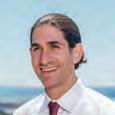
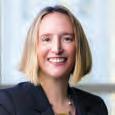
Professor Matthew Liebman
Published “Representing Animals” in the Maryland Law Review
Visiting Professor Michele Neitz
Published “Ready or Not: How Congressional Dysfunction and Loper Bright Enterprises v. Raimondo will Shift U.S. Regulation of Emerging Technologies to the Federal Bench” in SMU Law Review
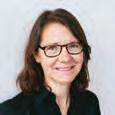
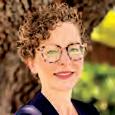
Professor Julie Nice
Received the 2025 John Adler Distinguished Professor Award, voted on by the members of the Class of 2025.
Professor Allison Tirres
Published “Political Participation in the Shadows of Citizenship” in the UC Law Journal
“People often ask me why I stayed at USF for so long,” reflects Professor Edith Ho. “For me, it has always been about the students. I’ve loved my students, and it’s been an honor to teach them and to be a small part of their journey through law school.”
After more than three decades of service, Professor Ho has retired from USF Law, leaving behind a legacy of commitment to legal education and student success. During her tenure, she taught in the Legal Research, Writing, and Analysis Program, directed the Legal Writing Program, and led both the First-Year Moot Court Program and the Advocate of the Year Competition.
“ I wanted to help students achieve their dreams.”
Before entering academia, Ho spent five years working for the U.S. Department of Health and Human Services in Philadelphia. She then moved to California, where she practiced civil litigation for 12 years. A colleague’s tip about a teaching opportunity at USF Law eventually set her on a new path. After gaining classroom experience teaching a course at San Francisco State, Ho was hired by USF Law in 1992 as an adjunct professor.
One of Ho’s guiding motivations as an educator was to serve as a role model for all students and especially Asian American students. “When I attended law school, there were very few Asian Americans,” she recalls. “So when I started teaching, I knew that if I could support even one student in the classroom, then this path—teaching— would be more meaningful to me than litigation. I wanted to help students achieve their dreams.”
Over the years, Ho has witnessed sweeping changes in legal research and writing, particularly with the rise of technology. “We’ve seen a major evolution, from books to online databases to now integrating artificial intelligence into the writing process,” she says. “The LRWA Program has adapted continuously to ensure our students are prepared. During my seven years as director, that was always my focus: making sure our students had the tools to succeed.”
Alumnus Carl Hammarskjold ‘11 recalls that as a student, “Professor Ho patiently taught me how to write like a lawyer, which required me to break the stubborn ‘bad’ habits I entered law school with.” And as importantly, he adds, “She demonstrated that one could succeed in the legal profession and be a good, honorable, and decent person.”
For Ho, USF Law has been more than a workplace—it has been a community. “What makes this place special are the friendships I’ve built with colleagues and the shared commitment to the university’s mission,” she says. “There’s a deep, underlying purpose here: to do good for society. Whether our graduates go on to work in large firms or small nonprofits, USF Law plays a vital role in preparing them to serve the community.”
In retirement, Ho plans to focus first on caregiving for her family. Afterward, she hopes to travel, reconnect with loved ones, and explore new hobbies. “Being a lawyer and a teacher has been all-consuming,” she says. “I spent many weekends and evenings grading. I’m looking forward to this next chapter—and to rediscovering life beyond the classroom.”
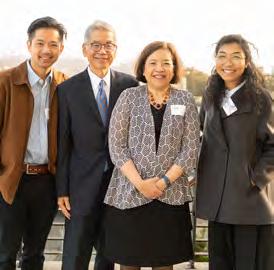
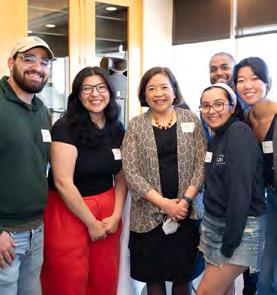
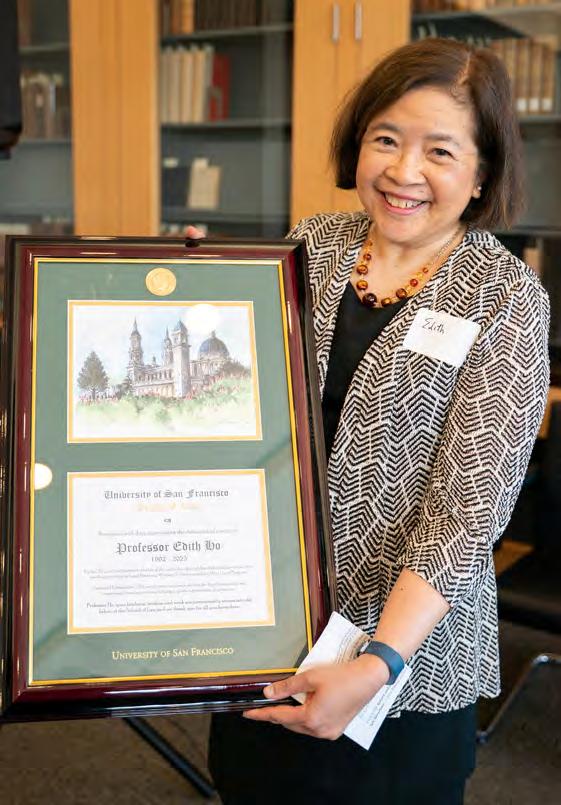
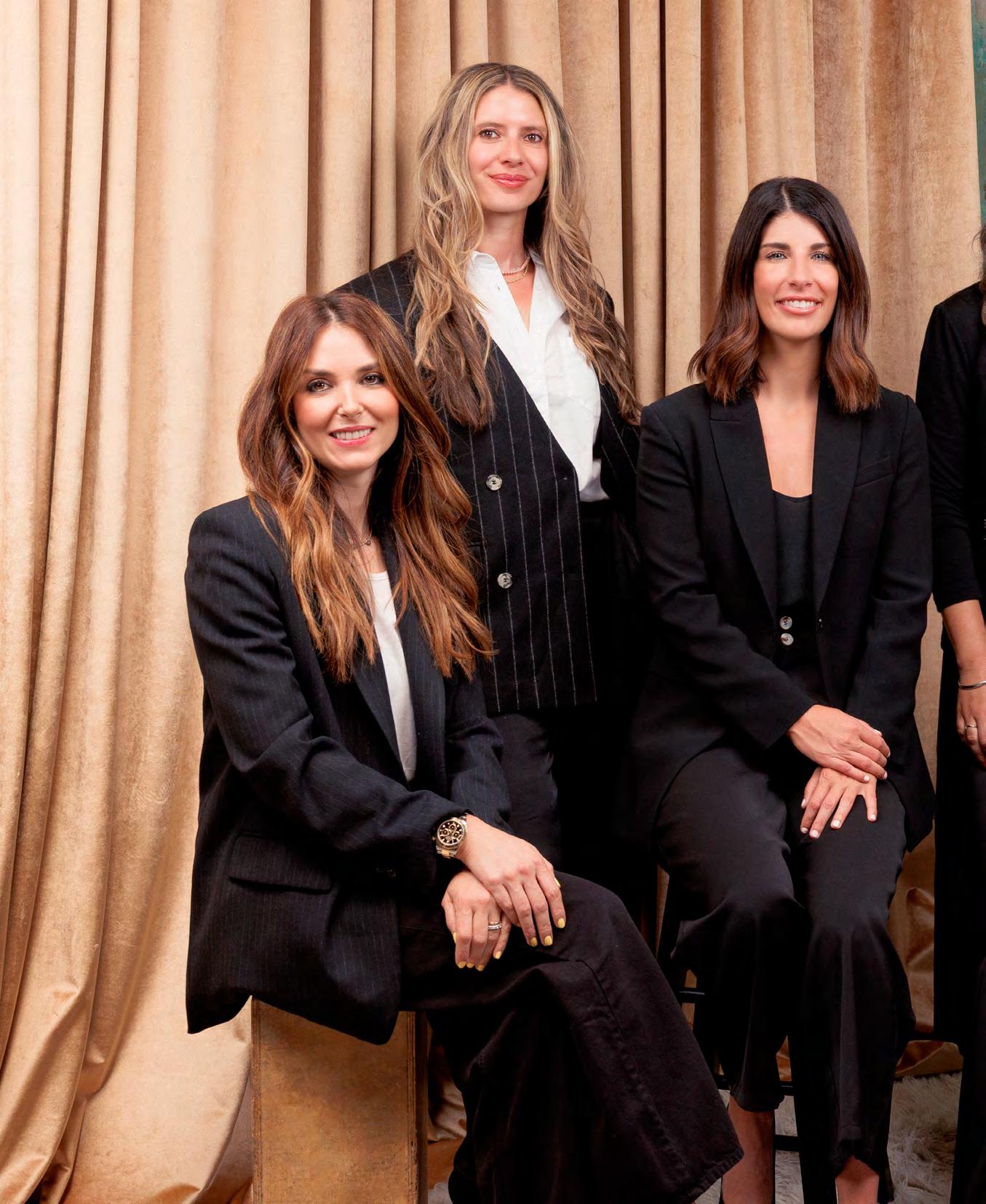
USF LAW ALUMNAE DESCRIBE WHAT IT’S LIKE TO LEAD AT NETFLIX
BY ANNIE BREEN
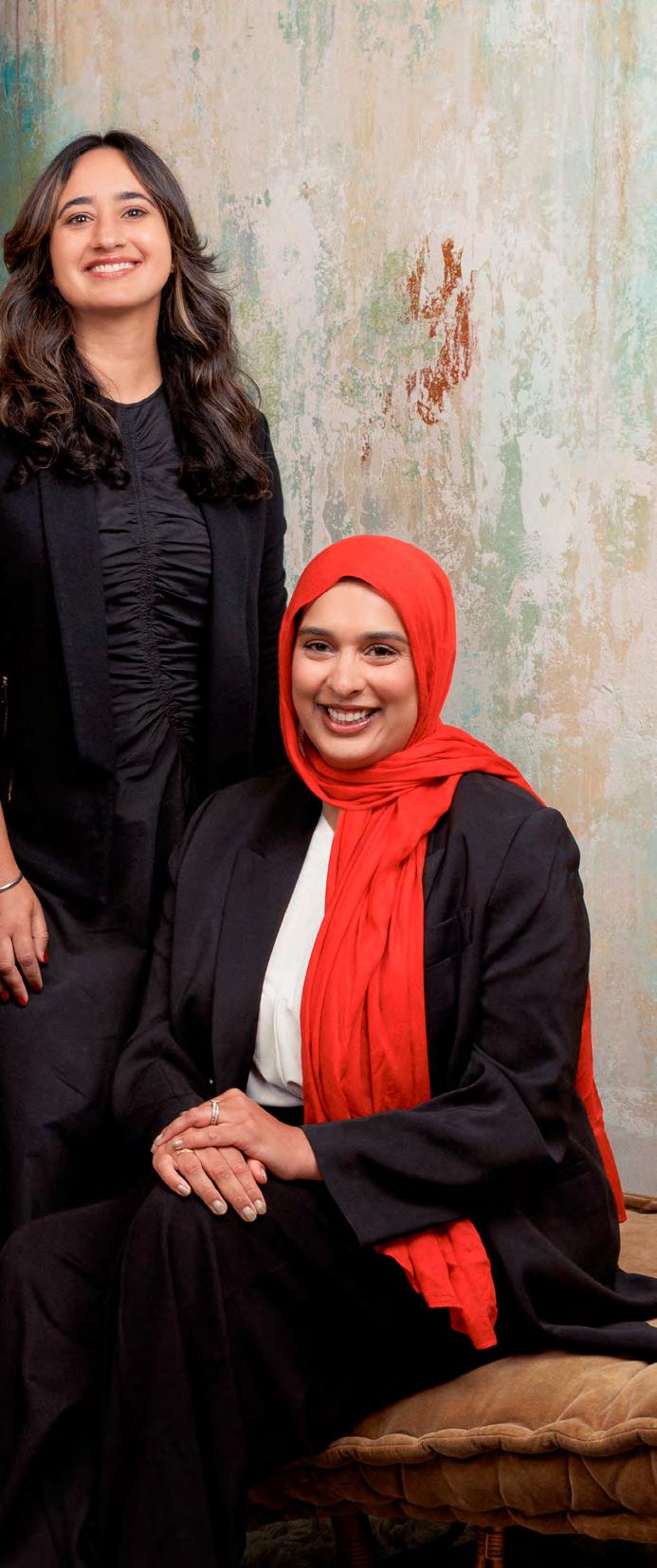
★Five USF Law alumnae are part of the deep bench that streaming entertainment juggernaut Netflix calls its “Dream Team.” Referencing the legendary 1992 U.S. Olympic basketball roster that included Michael Jordan, Magic Johnson, Larry Bird, Charles Barkley, and Karl Malone, the company’s recruitment site says it “model(s) ourselves on a professional sports team, not a family. Families are about unconditional love … Professional sports teams, on the other hand, focus on performance and picking the right person for every position, even when that means swapping out someone they love for a better player.”
The five players described here—Mary Katherine Ashmore ‘19, Masha Koltsov ’13, Maahum Chaudhry ’14, Simron Gill ‘12, and Maya Giladi ’13—bring their expertise to a range of business units, shaping how Netflix navigates the evolving entertainment landscape. Here, they reflect on their legal lives on the Netflix court, describing their various areas of entertainment law, sharing what a typical workday looks like, and explaining why they love working for a company that strives to make the most out of each of its “player's” talents.
As director of Product & Tech Legal (Studio), Masha Koltsov supports Netflix’s Content Innovation and Operations team, an intersection of technology and creativity.
“Depending on a project or initiative, I may be assessing legal risk, drafting or reviewing contracts, or summarizing legal guidance and answering questions.”
Something she appreciates about Netflix is the established collaborative environment across divisions. “I feel lucky to be considered a partner to my business teams—I’m brought in early on. Instead of being seen by our business team as a legal 'blocker,' I participate in and advise on what a deal could look like and issue-spot early on.”
The breadth and diversity of practice offered by entertainment law was surprising to Koltsov. “There are so many parts of the content production workflow that lawyers touch—from rights acquisition, to negotiating deals, to where I am now on the technology side that supports content production with tools and services.” And while she noted that in many ways, entertainment law has been dominated by men, she thinks that Netflix is leading the charge when it comes to championing women in the field.
Koltsov acknowledges that the challenges she faces as a working mother are universal. “The hardest part for me has been finding the balance of advancing in my career with managing my family obligations.“ Luckily, Netflix has cultivated a culture where working mothers are supported.
“We really focus on inclusion and it shows in the legal team Netflix has built,” Koltsov says. “There are many women, including in senior leadership.” She emphasized that this representation at the highest corporate levels has helped shape the culture of all its teams.
When asked what she’d say to USF Law students wanting to follow in her footsteps, Koltsov stressed the importance of keeping an open mind. Her own willingness to learn about new (and seemingly non-adjacent) legal areas has benefitted her career: “When I first came to Netflix, my role was different than the production work I was previously doing, but supporting the Visual Effects and Virtual Production teams (who respectively create images used in film and use technology to digitally capture images) provided an understanding of the vendor ecosystem and shaped many of the considerations I look at now.”
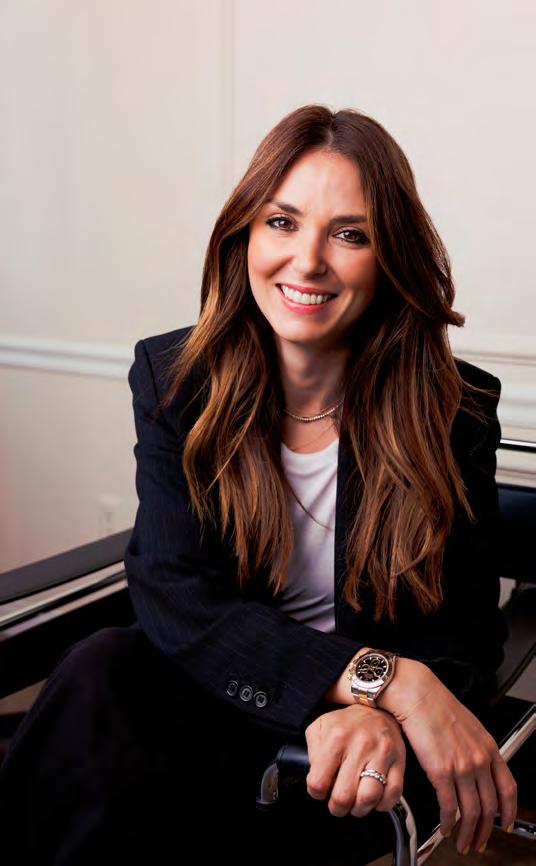
If you’d asked Maahum Chaudhry when she was at USF Law how she thought she’d put her JD to use, public interest work would likely have been top of the list. But thanks to chance and the right timing, she landed in the role she now describes as meant for her.
She explains her work as the majors manager on the Rights Management team at Netflix as leading “a small but mighty team, and interacting with folks in many parts of the company. I talk with colleagues in accounting, marketing, licensing, operations, and engineering each day, which helps me get a more holistic perspective on what the company is doing. I’m glad I’m not siloed in my own little legal bubble; it makes all our hard work feel more rewarding when I get to see how my efforts fit as a small piece of the greater puzzle.”
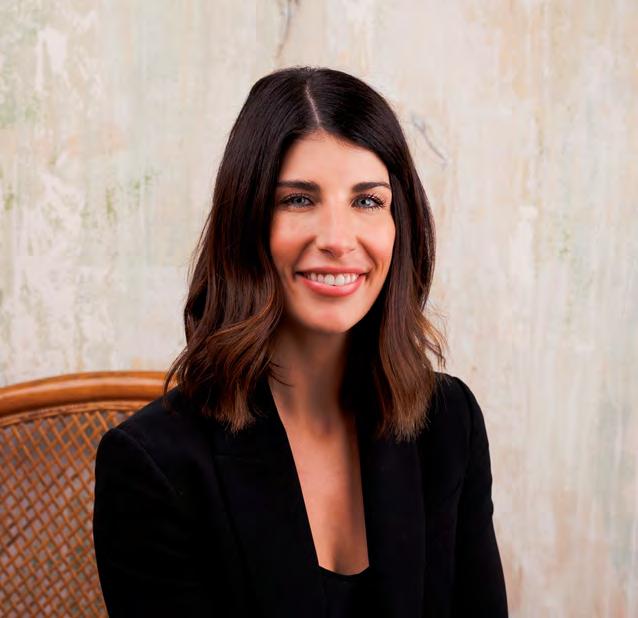
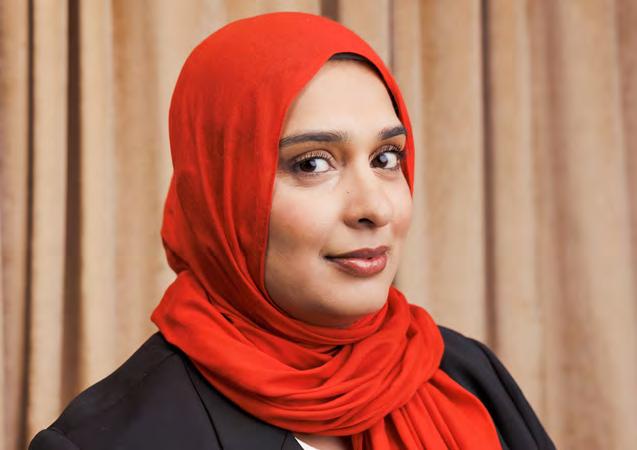
Also rewarding is the way Netflix allows her to integrate her work life with the rest of her life. “I’m unapologetic about my identity and believe in bringing my full self to work. My religious identity is visible on me,” she says [Chaudhry is Muslim and wears a hijab], and adds, “I believe I am able to do my work well because I don’t have to add to my mental load turning any part of my identity ‘on’ or ‘off.’”
Chaudhry’s tasks include closely reading license agreements in order to understand and disseminate necessary information across the company, including to non-legal counterparts. Her team then
inputs that data across various internal databases and shares the information with cross-functional partners. “Our data input greenlights when a title can be available live on Netflix,” she says, so an obsession with details is a must.
Her role is about more than a preternatural ability to digest and disperse complex legalities, though. “My day also heavily focuses on managing my team of direct reports and advocating for their needs, be it dealing with a difficult business partner or pushing for tooling enhancements to make their work more efficient.”
As counsel on the Experiences team, Ashmore oversees all legal aspects of Netflix Attractions, a slate of content-related experiential opportunities for fans. This includes one of the company’s newest ventures, Netflix Houses, described as “rotating immersive experiences including exclusive merchandise, food, drinks, and much more,” which opened in Dallas and Philadelphia in mid-2025; Netflix Bites Restaurant in Las Vegas; and Netflix Licensed Experiences (think entertainment venues that immerse fans in hit shows like Bridgerton or Stranger Things) scattered throughout the world. Of the wide variety of properties she touches, she says, “I am lucky to support a wide array of colleagues on many different business teams. In a single day, I can find myself negotiating a talent voiceover engagement for one of our experiences, advising the marketing team on IP usage and approval, or collaborating with the Music Legal team on song clearances. One of the exciting things about the job is that no two days are the same (aside from starting every morning with a brisk walk with my Australian Shepherd, Georgia).”
Ashmore was as surprised as Koltsov by just how broad entertainment law is. She notes, “Sure, there are lawyers who represent actors, writers, and directors in film and television, lawyers who help musicians and songwriters, but I don’t really do any of that. As in-house counsel, our team supports several business units and provides comprehensive legal guidance where needed. We’re essentially air traffic controllers at a very large and busy airport— supporting many different teams from a legal perspective and ensuring everything is taking off and landing smoothly.”
She credits her former USF Law professors with shaping the way she thinks and approaches the law, saying that “I cherished my time in law school largely due to the incredible professors. I have so many fond memories, like Levi Strauss campus tours with Professor Onda, essay review sessions with Professor Travis ('Shall we? We shall!'), and discussions about current entertainment trends with Professor Harvey.”
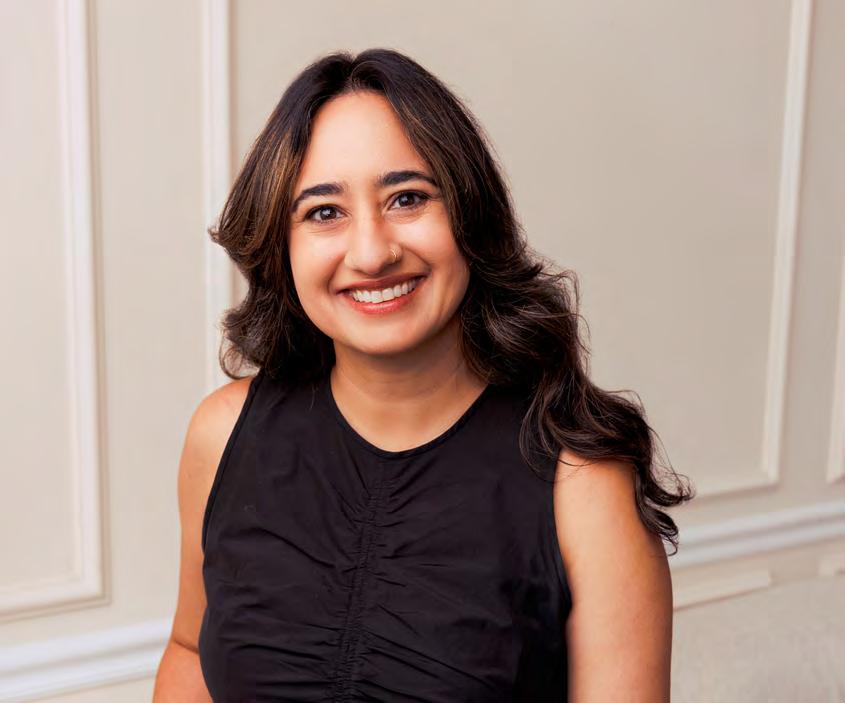
As Principal Counsel, Intellectual Property, and Content Legal, Simron Gill's legal portfolio spans animation, games, film, and series. “I handle issues from the deal stage to production and distribution, guiding the company through the legal complexities of everything from rights clearance and licensing to fair use and defamation risks,” she says.
No two days look alike. “I may get a question from a business and legal affairs executive, who is negotiating an underlying rights agreement about enforcement rights or indemnification provisions. From there, I may have a show-level clearance question get escalated to me about recreating a real company in a series.”
But the range and complexity are what she loves about the work. “Being in entertainment means I get to play a small part in the stories and creative process that result in a product that helps people have
fun, relax, share new ideas, or have a good emotional cry. I also enjoy solving difficult problems and explaining issues in multiple ways so that non-legal and legal folks can understand the issues easily.”
Gill stresses that being in-house requires knowing the entertainment business insideout … and admits that there was a steep learning curve for her. “Even though I was basically raised in my parents’ video rental store when I was young, I didn’t have any ties to the entertainment industry growing up. My first few years at Netflix were a big adjustment as I learned more about the industry.”
Gill is grateful for the company’s “Dream Team” aspirations when hiring. “My boss, Barbara Quinn, is also a USF Law alumna and a mother. She’s been a great mentor and understands the importance of prioritizing significant family moments. As a professional, there will always be something you have to give up to build a career you’re proud of, but it makes it worth doing when you are also developing in an industry and field you are passionate about.”
“Being in entertainment means I get to play a small part in the stories and creative process that result in a product that helps people have fun, relax, share new ideas, or have a good emotional cry.”
SIMRON GILL
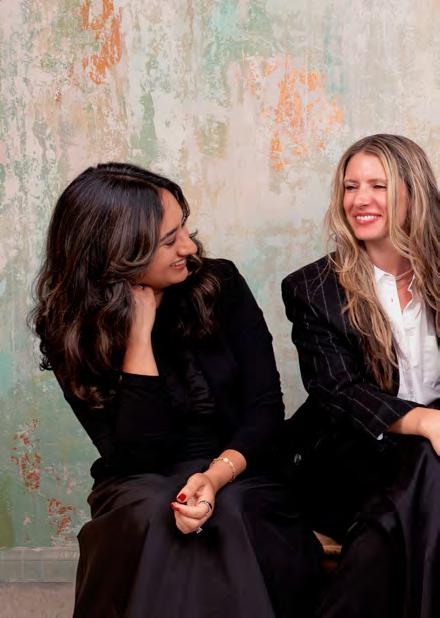
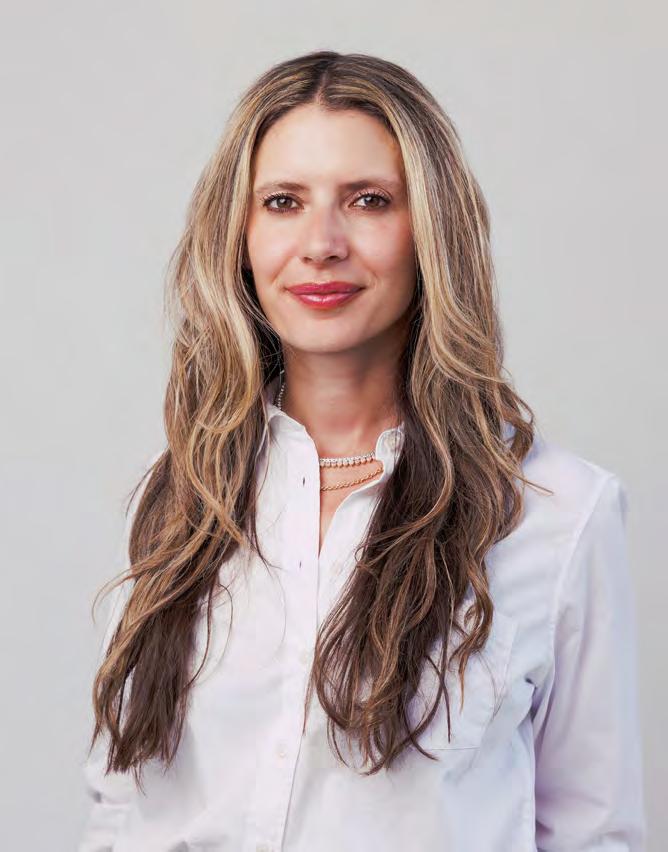
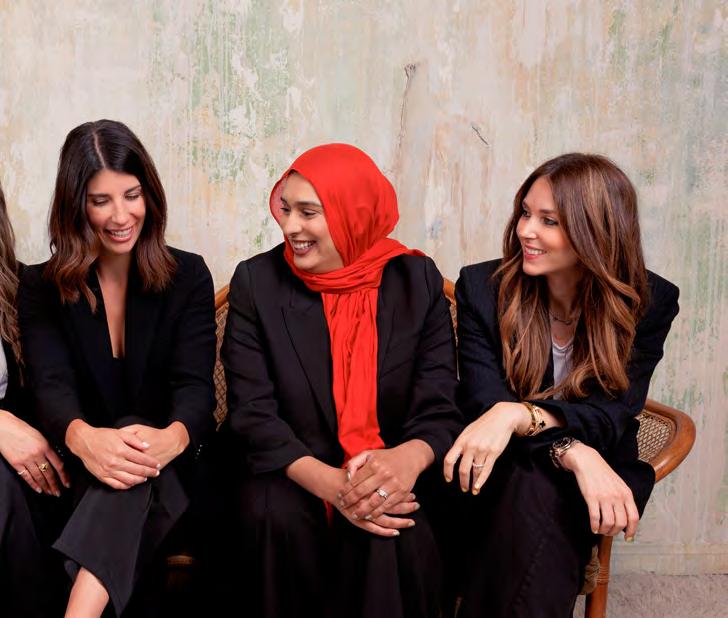
Business and Legal Affairs executive Maya Giladi spends her days negotiating deals on behalf of the Netflix studio to engage talent—including actors, writers, producers, directors, and other creatives— for the company’s many scripted series.
Giladi credits what she calls USF Law’s “excellent IP program” with helping direct her to entertainment law. “Though I don’t practice directly in copyright or trademark law now, I remember loving those classes and being drawn to this field.”
In that field, Giladi delights in a role that she compares to solving a creative riddle, saying, “I love the satisfaction of closing a deal after heavy negotiations, especially when it is for ‘must have’ talent. I love finding innovative and flexible ways to close deals without disrupting our company precedent. It’s great to be able to meet and balance the needs of all cross-functional partners with whom I work.”
The confidence to perform said heavy negotiations is well-earned, having honed her teeth on the business affairs side of entertainment law, which traditionally tends to be more male-dominated.
“Over time, I learned to stop saying 'sorry,’ and that I don’t need to always use an exclamation point to soften my tone,” she says. And though this happens less often now than in her early days of practice at other entertainment companies, Giladi feels she had to work harder to be taken seriously. “However, Netflix has a lot of women in leadership. I think this company paves a strong path for women, including my own boss, Starr Silver-Baker, and the head of our entire US/Canada Business & Legal team, Mandy Schaffer—both of whom are working mothers.”
As is Giladi. “I now have a one-year-old daughter, and I think about both the world I want her to grow up in and the type of working mother I want her to see. Hopefully, I’m doing her proud.” n
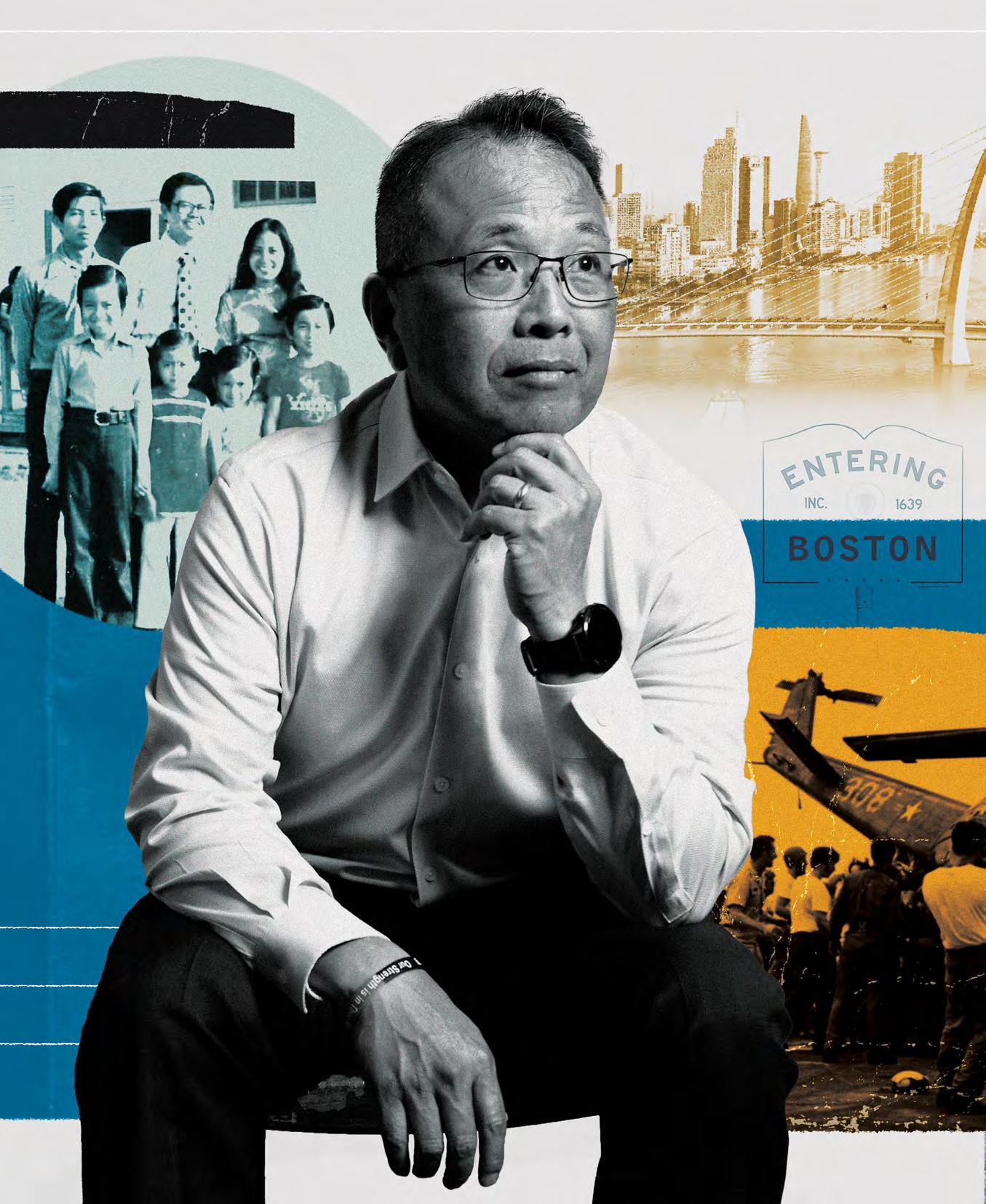
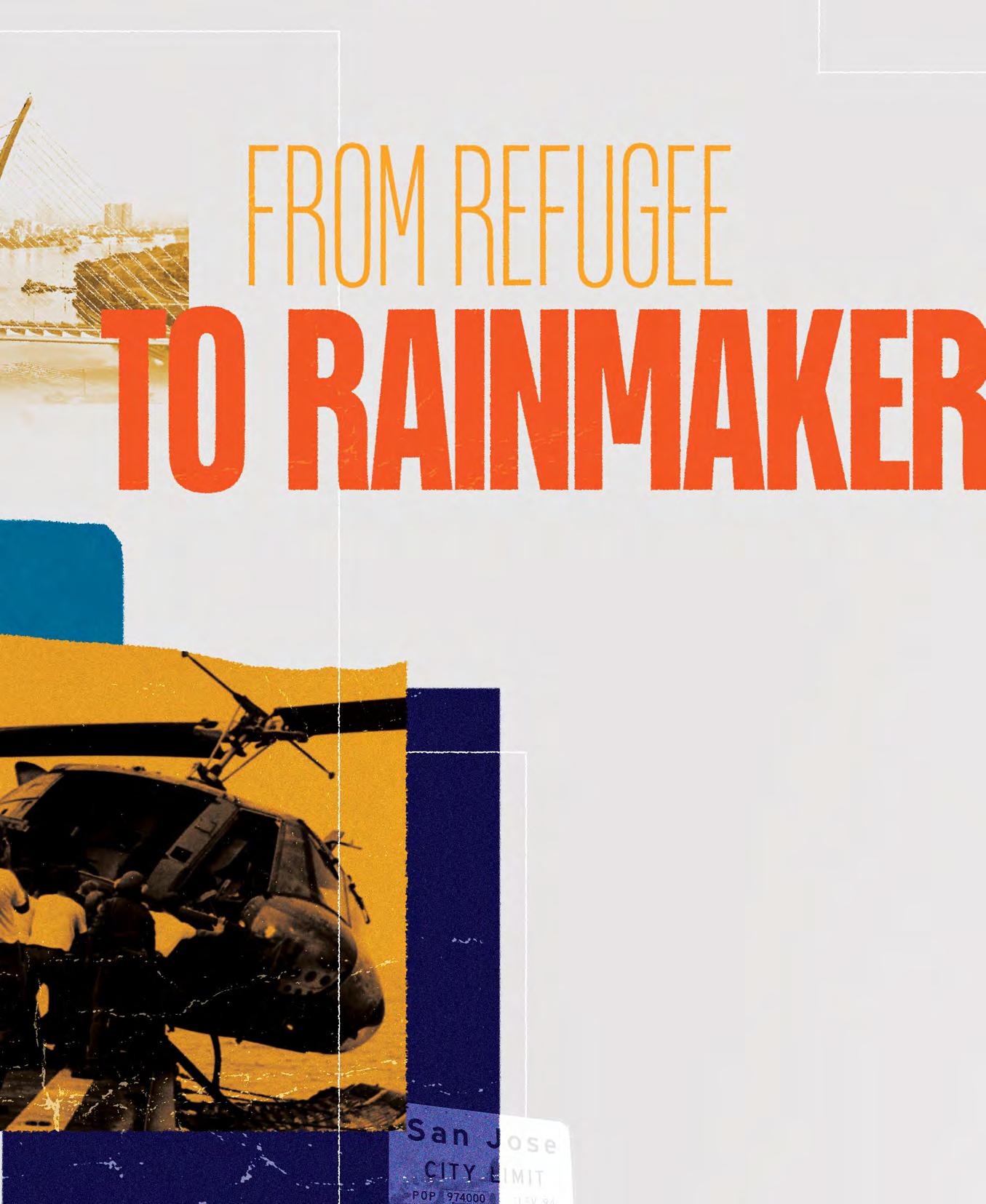
USF alumnus and intellectual property lawyer brings grit and good humor to his work and to his life
BY EVAN ELLIO T
Ask Chinh Pham ’93 to describe himself and he’ll say, “I practice law, and I help clients protect their innovations as well as monetize their innovations.”
But what you won’t hear is this: He fled Vietnam when he was 10 years old. Straight out of college he had a biotech career in Silicon Valley. He made a leap to USF Law. He lost a bet and moved to Boston. He ran his first Boston Marathon as a bandit.
“That’s a long story!” he laughs. “Are you sure you want to hear it?”
On April 28, 1975, 10-year-old Chinh Pham stood on the roof of Hoan My Hospital in Saigon and watched a rocket strike a South Vietnamese fighter jet in midair. “I tried to see if the pilot ejected, but I couldn’t see through all the fire and smoke,” he says.
The next day, as the North Vietnamese Army approached Saigon and the South Vietnamese government prepared to surrender, Pham and his family—father, mother, one sister, and two brothers— gathered only what they could carry and piled into a boat along with other families trying to escape. The boat took them down the Saigon River toward the South China Sea.
After two days on the sea in search of a ship that would take them aboard, Pham and his family found the USS Duluth. They were brought on board and directed to the ship’s highest deck. From there they watched crewmembers push helicopters overboard to make room for more people. The Duluth, designed to carry 800 troops, took aboard nearly 2,000 South Vietnamese refugees.
“For my father in particular, it was either leave Vietnam or get thrown into a reeducation camp,” Pham says. All members of the South Vietnamese military and any civilians who worked with Americans or had a higher education were suspect in the eyes of the North Vietnamese, he explains. “My dad was educated in Germany and the U.S., so most likely an enemy of the communist state.”
As Saigon fell, the USS Duluth carried Pham and his family to the Philippines. From there they flew to Guam in a military cargo plane, strapped to the floor because the plane had no seats. Then they were flown in a passenger plane to a refugee camp in Fort Smith, Arkansas, and arrived on May 12, 1975.
“We ended up in Iowa that August after leaving the refugee camp because my dad found a job and a sponsor there,” Pham says. For the next several years, the family moved to Detroit, then Houston, and then San Jose to follow job opportunities. Pham attended UC Berkeley and studied genetics. Then he worked at several biotechnology startups in Silicon Valley.
“For whatever reason, the lawyers who represented these companies would often come up to me and say, ‘You should go to law school,’” he says.
Pham studied law, in part, because it offered a better return on investment than business school.
“There’s a whole lot of MBAs out there but not quite as many IP lawyers, so I figured I could find work as an IP lawyer,” he says. At the time, only Santa Clara and USF had intellectual property programs in the Bay Area, “and I knew and admired Professor Thomas McCarthy at USF,” so he chose USF for law school.
“USF taught me grit,” Pham says. Early in his second year, he contacted five law firms in San Francisco. He told them that he wanted to gain experience in IP and asked if they’d let him work for free.
“I was surprised at how available he is. He’s a busy IP lawyer and he’s all the way across the country and he makes me a priority.”
“They all said yes,” he says. He chose a boutique firm called Fliesler Dubb Meyer and Lovejoy and started working there 20 to 25 hours per week.
Then he got another idea.
“I mentioned to one of the assistant deans that I’m working at a law firm for no pay.
‘Can I get course credit?’ She told me, ‘We don’t have an IP externship program. Set it up!’ So, I did.”
For the next 18 months, Pham worked part-time at Fliesler Dubb Meyer and Lovejoy. Then, in his third year, a few weeks before
graduation in 1993, they offered him a full-time position that he couldn’t accept. His fiancée, Laureen McVay, was in business school in Boston at that time, and she too was set to graduate.
“Laureen and I had a playful bet: Whoever received a job offer first gets to decide where we’d live after graduation,” Pham says. “She got an offer from a company in Boston a few weeks before I got the offer from the firm in San Francisco, so I lost the bet and moved to Boston! We’ve been married going on 32 years. Guess things worked out ok for us.”
Today, Pham is a principal shareholder at Greenberg Traurig LLP in Boston. In addition to co-leading the firm’s venture capital and emerging technology practice, he has particular expertise in what he calls “the strategic creation, implementation, and protection of intellectual property rights” for technology clients.
“Imagine back in the day before any vehicles were invented,” he says. “You tell a patent attorney that you have this great idea. It’s this thing that you can sit on. It’s got a wheel you can pedal, and you get yourself around. That patent attorney likely will say, you’ve invented a unicycle. If you secure a patent for a unicycle, then pretty much all you get is the unicycle and bragging rights. But if you approach me, I’ll get you a patent with you as the creator of a vehicle that has a wheel. Then, when someone else invents a bicycle or a tricycle or a carriage or a car that runs on two wheels or more, all of those inventors will need to get a license from you because your patent covers a vehicle having a wheel—that is, at least one wheel. So, with a strategically written patent, you can actually make money from licensing fees.”
Pham credits Hugh Dubb, a partner at Fliesler Dubb Meyer and Lovejoy, with teaching him about intellectual property and the business of law.
“I noticed the way he practiced was really more about business than about law,” Pham says. “He told me that anyone can draft a patent application. That’s not hard to do. But what’s the point of a patent? A patent is a negative right. A patent is defensive.
A patent only prevents; it doesn’t give the holder the right to do something. I want to enable. To me, the highest purpose of a patent is to help a client achieve a business objective, and helping clients achieve their business goals is what brings me to work.”
Pham is also active in the Boston community and has advocated for others throughout his career. He was elected president of the Boston Bar Association for 2022–2023, the first Asian-American attorney to hold the position. He has also served in other leadership roles, including as president of the National Conference of Vietnamese American Attorneys, chair of the Boston Museum of Science’s Board of Museum Advisers, and as an adviser to academic institutions including Harvard iLab, The Garage at Northwestern University, IDEA at Northeastern University, and Columbia University. Pham recently joined the USF School of Law Board of Counselors as a way to give back to the school that helped launch his legal career. In everything he does, he says, he pushes to build more diverse and inclusive communities.
When he isn’t practicing IP law or advising or volunteering, Pham mentors USF Law students. And when he isn’t mentoring USF Law students, he runs.
“I wish I’d had a mentor during law school— someone to tell me how law and business and technology overlap in the real world,” he says. “One of the things I like about USF is that it’s a hands-on education. It’s not an ivory tower.”
Each year Pham mentors one or two USF Law students who connect with him through the Alumni Mentor Program. One such student, Jacqueline Nemanich ’25, asked Pham if she should spend the summer after her second year working for a federal magistrate judge or interning at a midsize civil litigation firm in San Francisco.
“He said to me, ‘Why not do both?’ Nemanich says. ‘Ask them if you can split your summer!’” She ended up working eight weeks for the judge and then 15 weeks for the law firm.
In the fall semester of her third year, Nemanich received two job offers, one from the midsize law firm and the other from a big
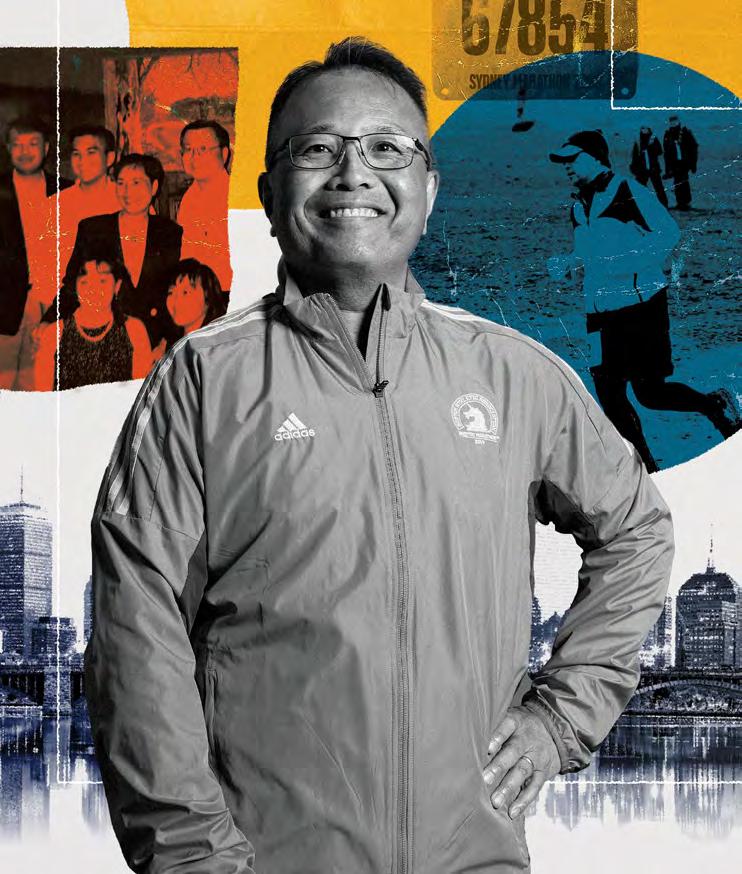
law firm. With Pham’s counsel, she chose the big law firm. “I’ll be working in commercial litigation, primarily with tech companies. It’s intellectual property-adjacent,” she says.
Nemanich says that she’s grateful to Pham. “I was surprised at how available he is. He’s a busy IP lawyer and he’s all the way across the country and he makes me a priority.”
Pham also mentors law students and lawyers in the Boston area.
“Sometimes a lawyer will say to me, ‘I’m disappointed that I didn’t make partner, and I didn’t make partner because I wasn’t given the opportunity to attend pitches or to work on big cases.’ I ask them, ‘Why do you think you should be given those opportunities?’ Why not make your own opportunity? My motto is that your success should not be dependent solely on anyone else’s action, and your failure should never be the result of someone else’s inaction.”
When Pham ran his first Boston Marathon in 1999, he didn’t register. “I just showed up,” he says. “The race officials strung a tug-
of-war rope across the back of the starting line and said to those who did not register, ‘Bandits, stand behind this rope!’ They gave us a bib to pin to our shirts. It actually said ‘Bandit’ on it. So we all stood behind the rope and waited for the official entrants to start. After they started, the officials dropped the rope and it was our turn to run.”
Why did Pham run as a bandit?
“It was my first marathon. I just wanted to try it,” he says. “If they stop me, they stop me. I’d rather try and fail. I still have that ‘Bandit’ bib.”
Since then, Pham has run all six of the world’s major marathons—as an official entrant. “Boston, New York, Chicago, Berlin, Tokyo, London. At the end of August, I also completed the newest and seventh major marathon, in Sydney.”
Would he ever run a marathon in Ho Chi Minh City, formerly known as Saigon?
“I don’t know. I’ve only been back once and that was 20 years ago. Perhaps it’s time to conquer another challenge.” n
By Evan Elliot
Since 2015, approximately 200 USF Law students in the Immigration & Deportation Defense Clinic have worked with clinic staff to represent an annual average of 400 individuals and families in immigration court proceedings, with many clients successfully gaining asylum over the years.
So why isn’t Bill Hing celebrating?
“It feels odd to celebrate,” says Hing, professor of law and founding director of the Immigration & Deportation Defense Clinic. “Yes, we absolutely want to celebrate 10 years because we’re proud of our students and our staff and our work with clients. But on the other hand, when we win a case, we don’t want to celebrate or hold a press conference because many people don’t receive asylum, and people do get deported.”
Under the supervision of Professors Bill Hing ‘74 and Jacqueline Brown ‘05, law students in the clinic provide pro bono legal
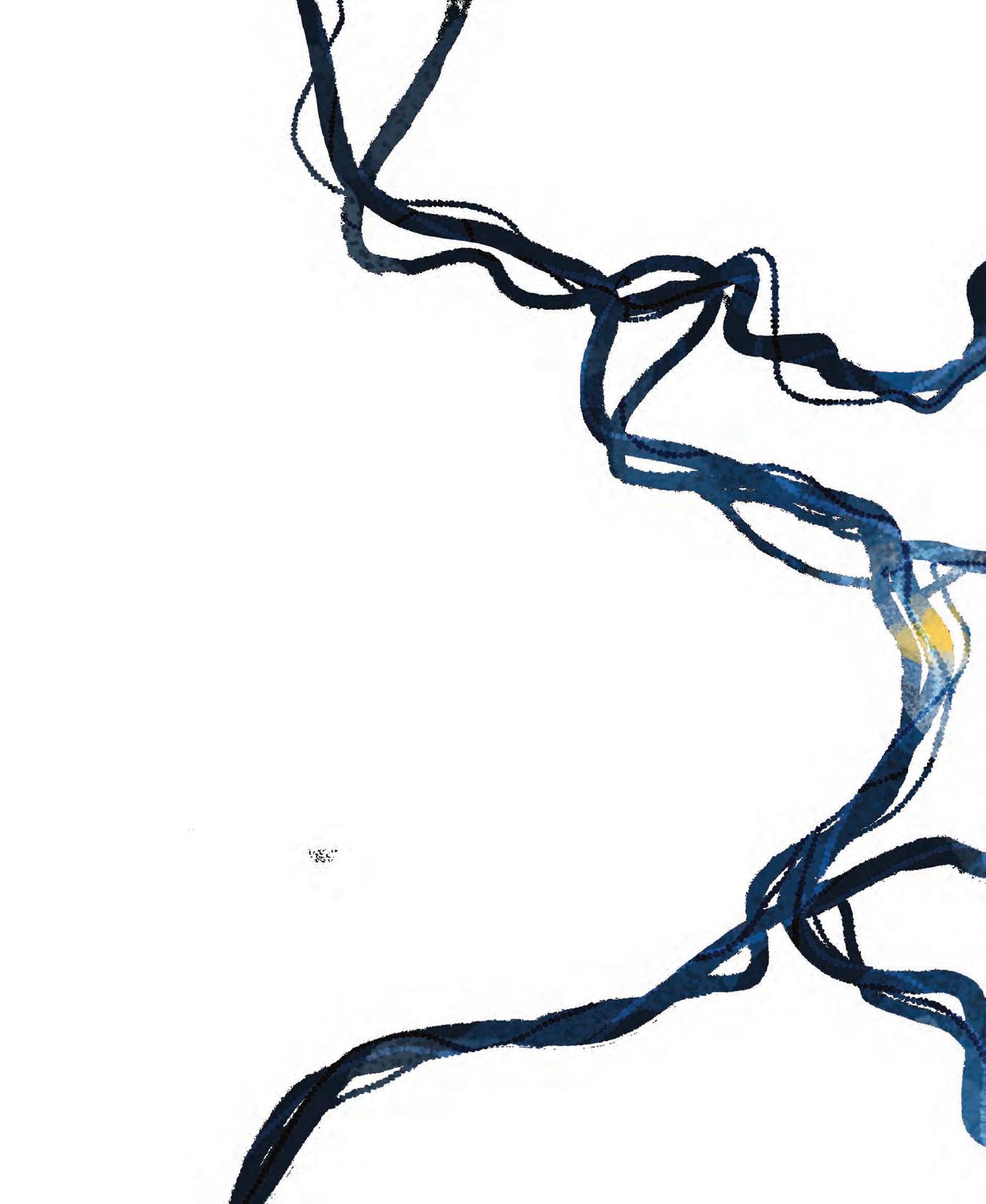
representation to clients in immigration court. Most asylum-seekers are fleeing violence in Guatemala, Honduras, El Salvador, and Mexico, Hing says. “These people have suffered trauma. These people have memory flaws. If we are present for them, pay attention to them, listen to them in a respectful way, we can gain their trust.”
Each client has a story to tell, Hing says. Each deserves to be treated as a human, not as a number on a docket.
“This is a teaching clinic, but it’s not like a teaching hospital where 12 medical students crowd into an examination room and listen to a patient give details about a traumatic event,” he says. “We don’t do that. It’s only Jacqueline and one student who meet with each client, in private.”
Here, to recognize 10 years of the Immigration & Deportation Defense Clinic, four School of Law alumni reflect on their work in the clinic—and on the professors who make the clinic work.
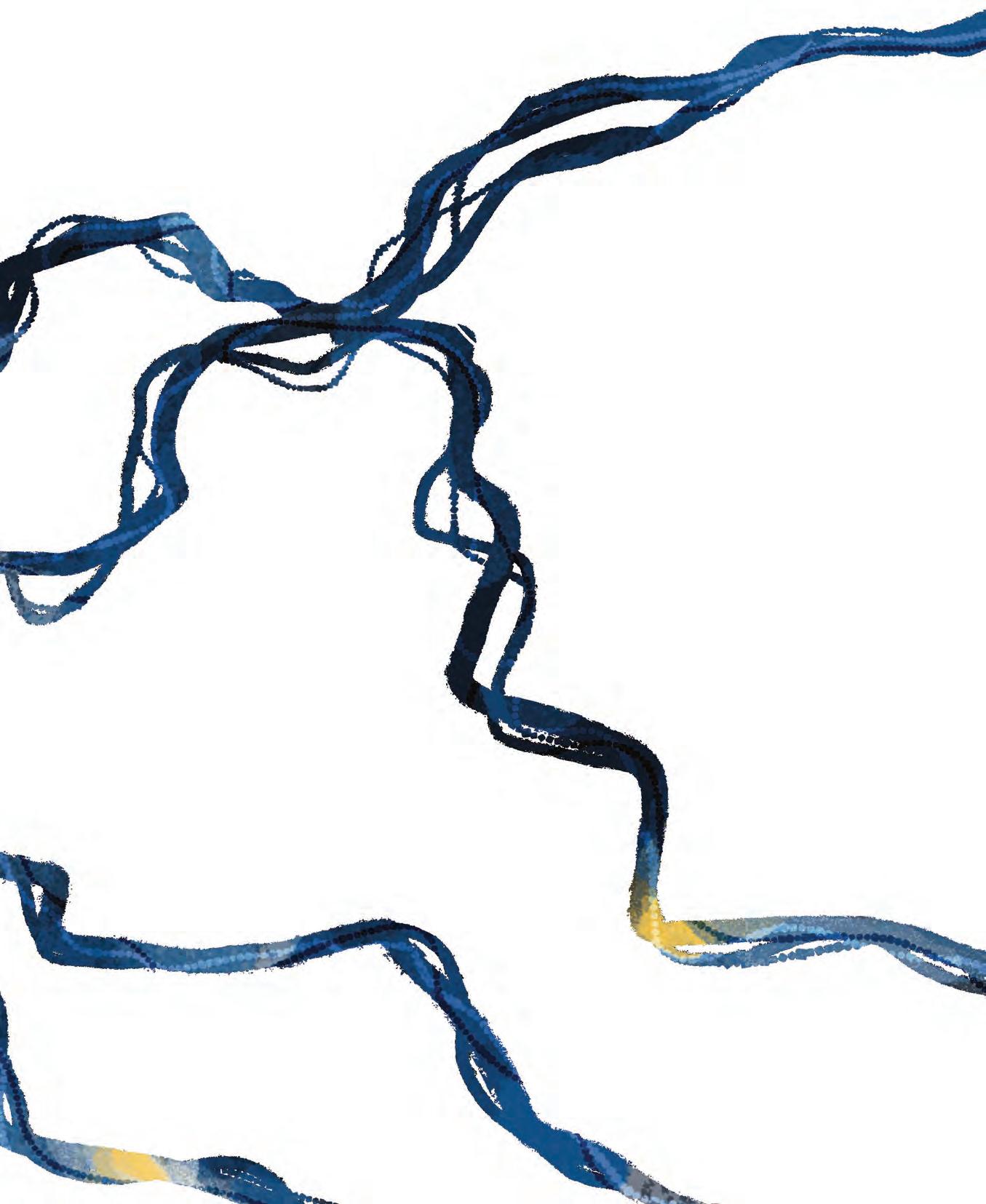
My client was a victim of crimes in her community in Mexico. It took a few meetings to get her to open up, because it wasn’t easy to talk about all of the things she’d gone through. Professor Brown reviewed the declaration and helped me prepare everything for filing. And then I went with my client to her hearing and presented her case in front of the judge. That was my first time in front of a judge, and Professor Brown taught me how to act in court, something that you can’t really learn in class.
The immigration clinic was one of the places where we could actually work with clients and put into practice the theories that we were learning in class. We walked clients through the process so that they understood everything we were doing, and they felt as empowered as possible to take on their case on their own. We, the students, were not the ones solving the problem, but we were instead helping our clients move through problems. One of the things that I tell my clients today:
“I trust you. I believe your story. But right now I’m going to ask you tough questions.”
One of my clients was from El Salvador. She was “recruited” as a gang girlfriend. She received death threats and feared abuse if she didn’t do as she was told—sell drugs, deliver drugs, and carry out the gang’s extortion work. Professor Hing and I met with her and got to know her. I think she felt at ease with Professor Hing and with me, as she understood we were there to advocate for her. With each meeting, she became more trusting and empowered with confidence to tell her story before the immigration judge.
I was drawn to USF by the opportunity to train with the clinic and Professors Brown and Hing. I admire their commitment to advocacy, their integrity and resilience, and how they’ve trained an entire generation of attorneys. I’m so grateful for the training we’ve all had at the clinic, especially in community-based lawyering—their emphasis on a collaborative approach to building a case, viewing each client as a partner, and really working and learning alongside our clients to develop relationships of trust.
“Back in 2017 when the new administration began making changes to immigration policies, we [students] started talking about the most vulnerable communities, and we said, ‘We should just go to the Central Valley and provide free legal consultations.’ And Professor Brown and Professor Hing said, ‘You really want to do that?’ And we said, ‘Yes!’ And they made it happen. They got funding. They arranged everything. And for a whole week we were out in the Central Valley, providing free consultations, giving know-yourrights presentations, helping people fill out their applications for asylum. Each day we were reminded, this is why we’re going to law school. This is why we’re doing what we’re doing.”
—Gabriela Garcia ’18
“In 2016, all of us from the clinic traveled to Dilley, Texas, to work with detained mothers and their children, many of whom had just crossed the border, fleeing violence. Our role at the clinic was to prepare declarations and conduct interviews to do what we could to get the mothers and children out of jail. The detention center was essentially a prison, and that work really taught me the resilience of immigrant women and the brutality of family detention prisons. Our government is putting kids in cages. It’s something I will always remember.”
—Zulma Muñoz ’18
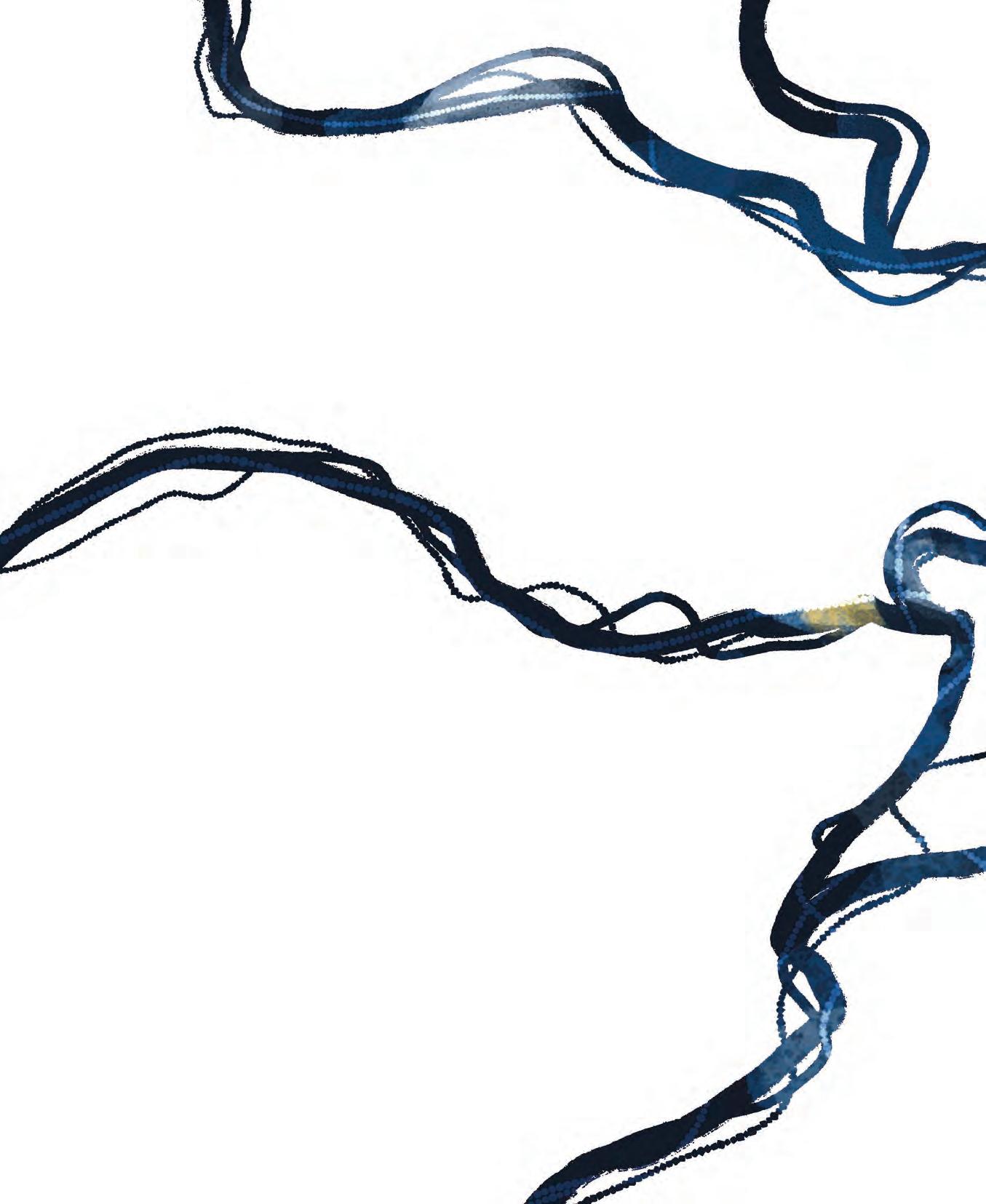
IMMIGRATION, LABOR, AND EMPLOYMENT ATTORNEY, OAKLAND, CALIFORNIA
Our client was a victim of violence. Professor Brown and I told her story through the declaration that we submitted as well as through her testimony in court. I remember questioning our client in court during direct examination. She did great. And once or twice, Professor Brown passed me a sticky note with a bit of advice written on it. We needed to tell our client’s story, and we needed to convince the judge that if this client is deported she will be harmed, and possibly killed. This is the reality of asylum cases.
As it happens, I had met Professor Hing back when I was in college. When my family was going through dep ortation proceedings, he and two USF Law students came to our home to help prepare declarations. So back then I resolved to go to USF for law school. It was a devastating moment in my life, but now I’m able to help families like mine.
IMMIGRATION ATTORNEY AT THE FLORENCE PROJECT, TUCSON, ARIZONA
My client was from Nicaragua. He took part in public protests against the government. In Nicaragua, dissent can get you thrown in prison or disappeared. My client fled north, and with the help of the clinic he told his story in immigration cou rt.
The Florence Project provides free legal services and social services to detained adults and unaccompanied children facing immigration removal in Arizona. I landed this job in February of my third year at USF. It’s the only position for which I applied. The immigration clinic is the reason I went to USF. Everything I do in my work today I learned from Bill Hing and Jacqueline Brown.
“Immigration law is a calling.”
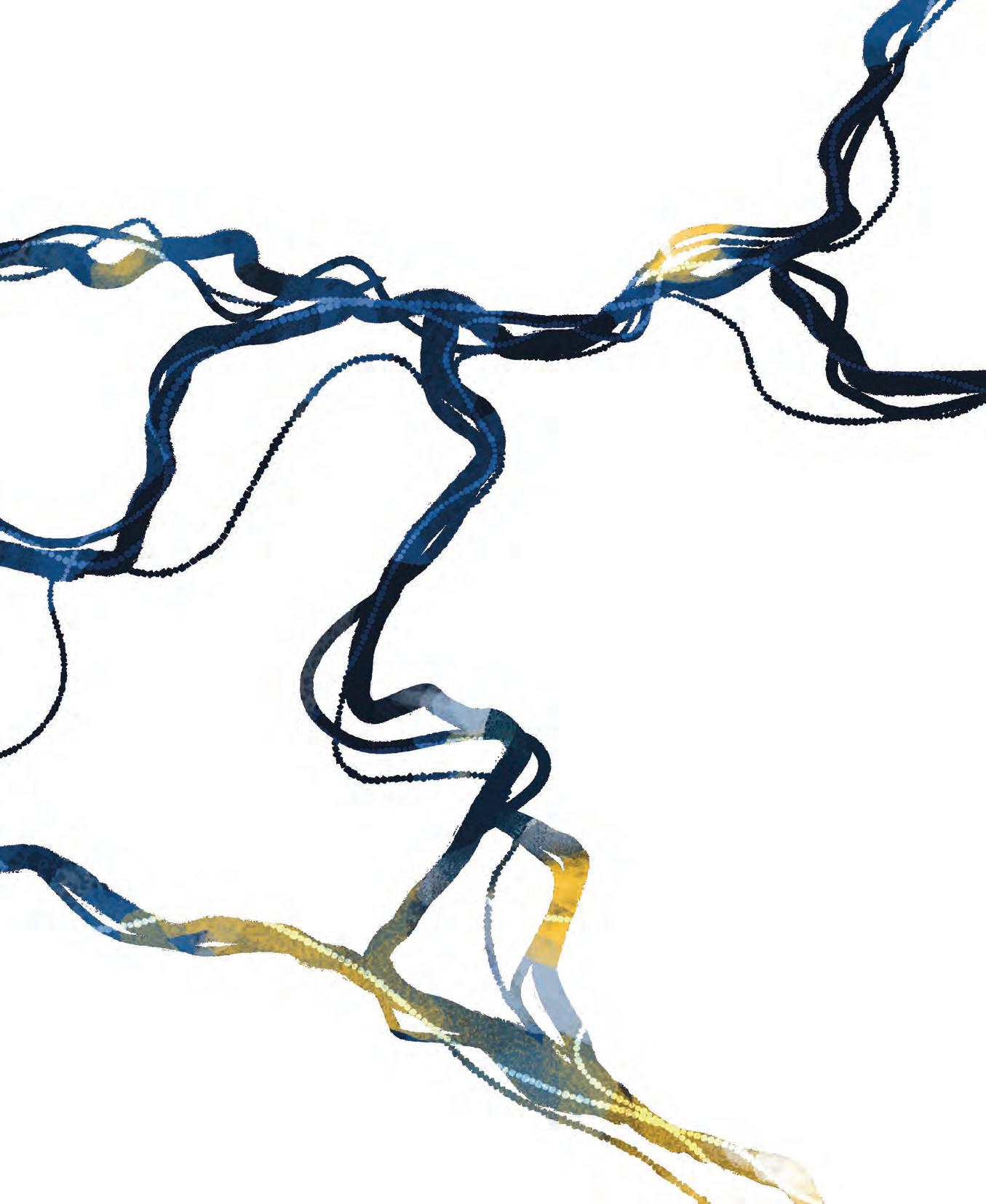
“Immigration law is a calling,” Hing says.
“It aligns with Jesuit education: be a person for others, help people in need. Asylum-seekers are people in need. They see the United States as a beacon of hope and justice, and we want to help them stay here because we believe that the U.S. should actually be a beacon of hope and justice.” n
’74
The Hon. Daniel Foley (ret.) received The Big Island Press Torch of Light Award for his work as chair of the Hawaii Commission to Improve Standards of Conduct.
’83
Daniel Wonzo Lee, country managing partner, DLA Piper, was named a 2025 Eminent Practitioner for Corporate/ M&A and Dispute Resolution: International Firms by Chambers Asia Pacific and a 2025 Leading Partner in Corporate and M&A, international firms by Legal 500.
’84 Matthew Beauchamp was appointed Calusa County, CA, district attorney.
Aileen Casanave was recognized by the African American Community Service Agency as an honoree on the 2025 AACSA Power 100 list.
’88
Sal Torres joined SoFi Technologies as assistant general counsel, Contracts.
’90
Alicia Fowler was appointed general counsel at the California State Transportation Agency.
Loretta A. Quick started a new position as law and motions supervisor at the Santa Cruz County Public Defender's Office.
’91
Stephanie Katz was elevated to counsel, capital markets with Cadwalader in the firm’s New York office
’93
Christopher Stretch joined Benesch as a partner in the firm’s Litigation Practice Group in San Francisco
’95
Michael Westheimer joined Constangy, Brooks, Smith, and Prophete as a partner in the firm’s San Francisco office.
’98
Ursula Jones Dickson was sworn in as Alameda County’s new district attorney She previously served as a judge on the Alameda County Superior Court.
Michael Jorgenson was appointed to the Independent Consumer Fuels Advisory Committee by Governor Newsom. Jorgenson has served as supervisory deputy attorney general at the California Department of Justice, Office of the Attorney General since 2018.
Michon Martin became CEO of Las Vegas marketing firm R&R Partners.
CELEBRATING JULIANNE CARTWRIGHT TRAYLOR
When Julianne Cartwright Traylor joined USF School of Law nearly two decades ago, her commitment to supporting students was evident from the start. Thanks in large part to values shaped by her parents, lifelong educators in the segregated South, and deep international experience through human rights work spanning Geneva, Oslo, Durban, and Beijing, she dedicated herself to a program that boasts alumni from nearly 100 countries.
During her tenure, the International LLM program evolved in step with the changing legal landscape. She helped integrate LLM students into clinics, student organizations, and leadership roles, and worked to ensure
students had the academic, professional, and personal tools to be prepared to take the bar exam, pursue Optional Practical Training, and succeed in law firms, government agencies, NGOs, and universities around the world.
In recognition of her many contributions, in 2025, Julianne received the USF Provost’s Innovation in Global Initiatives Award.
In retirement, she plans to continue her human rights work and reconnect with family, friends, and former students around the globe. She leaves USF with not just a program, but a global community of lawyers shaped by her care, advocacy, and unwavering belief in the power of legal education to advance justice. n
’00
Sean Gaffney, a partner with Crosbie, Gliner, Schiffman, Southard and Swanson, was named one of San Diego's 2025 Top Attorneys by SD Metro.
’01
Josh Binder was recognized with the 2024 Ambassadors for Peace Award by the Creative Community for Peace.
Christopher Hardy was promoted to US chief financial officer with Mercari US.
We would love to know where your degree has taken you, and share with you the latest news and alumni activities at USF. usfca.edu/law/alumni
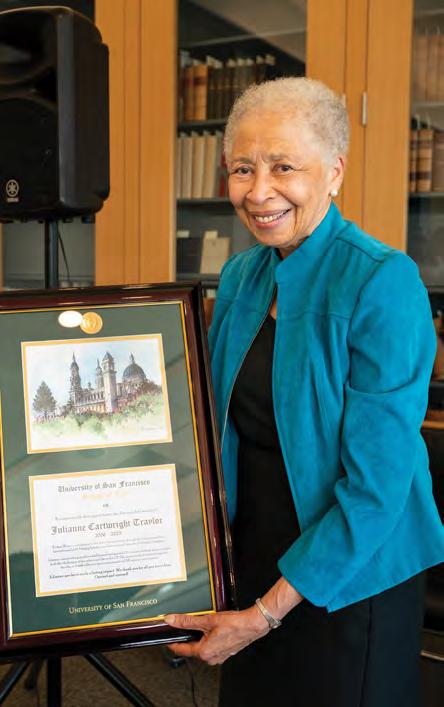
Erika Harriford-McLaren joined Blueyse, a global marketing agency, as chief operating officer.
Nicholas A. Rozansky joined Brown Rudnick as a partner to establish the firm’s Los Angeles office.
’02
Jonathan DeGooyer, chief legal officer and corporate secretary for SingleStore, Inc., was nominated for inclusion in Marquis Who's Who.
Elizabeth Hall-Scheirle joined Banking Circle, US as chief legal counsel and corporate secretary.
Daniel Sharp was elevated to shareholder with Jordan Ramis PC in the firm’s Portland, OR, office.
’03
Allyson Cook was named East Bay Regional Park District deputy general manager
’04
Aaron Crews joined Holland & Knight as a partner in the firm’s Innovation Practice Group
’05
Joshua de Larios-Heiman joined Klinedinst PC as counsel.
Jamil Nushwat joined the Fresno, CA office of Ogletree Deakins as of counsel.
The Hon. Karla Sarabia was appointed to serve as a judge in the Los Angeles County Superior Court. Sarabia previously served as a deputy public defender at the Los Angeles County Public Defender’s Office since 2008.
’06
Lynn Elliot joined Smith Entertainment Law Group as senior counsel
Marina Lewis joined the Solano County District Attorney’s Office as a deputy district attorney.
Allison Stone Anderman became the director of law and policy for CeaseFirePA, a nonprofit organization advocating for gun violence prevention.
Kiran Belur started a new position as vice president, trademark, copyright, and marketing legal at Salesforce.
Tiffany L. Gray became the assistant head of interactive at Sawhorse Productions, a full-service creative agency.
John Hong started a new position as partner and head of employment law practice at Chan + Punzalan.
Andrew Salenger was elevated to partner with Gordon Rees Scully Mansukhani, LLP in the firm’s Honolulu, HI office.
’08
Cristhian Escobar started a new position as vice president, markets and derivatives counsel at Galaxy.
Anthony Phillips joined Fox Rothschild in San Francisco as partner in the litigation department.
Robert F. Russell was elevated to partner with Younkins & Schecter LLP, the Manhattan-based firm.
Dash Talbot was elected a commissioner of the Los Angeles Superior Court. Talbot serves as a senior deputy Los Angeles county counsel.
’09
Dani Kleinman was named chief people officer and vice president, legal at Cruise.
The Board of Counselors and Board of Governors play a vital role in strengthening the USF Law community. These dedicated alumni lend strategic insight and support key initiatives, from major campaigns to signature events. As ambassadors and advisers, they help shape the future of the law school. We are thrilled to welcome the newest members of the Boards:


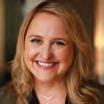
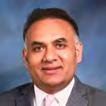

Anthony E. Graham ’68 Attorney, USF Trustee, and Business Owner
Gregory H. Blaine ’91 CEO, California Property Services
Britt Strottman ’00 Partner, Singleton Schreiber
Paul Ram ’04 Vice President & Legal Counsel, Ram JAJ Enterprises, LLC
Cameron R. Cloar-Zavaleta ’09 Vice President, Legal at Alaska Airlines | Hawaiian Airlines General Counsel & Asst Corporate Secretary
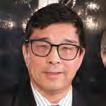
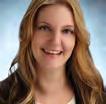
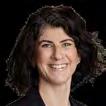
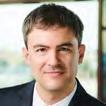
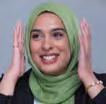
Mike Woo ’82 Tax attorney (retired)
The Hon. Erin Guy Castillo ’07 Superior Court of San Joaquin County
Whitney McCollum ’07 Partner, K&L Gates
Nicholas Larson ’10
Shareholder, Murphy, Pearson, Bradley & Feeney
Maahum Chaudhry ’14
Majors Studios Licensing Manager, Rights Management, Netflix
Bambo Obaro became the comanaging partner of the Weil, Gotshal & Manges LLP Silicon Valley office.
Cameron Cloar-Zavaleta was named general counsel and assistant corporate secretary for Hawaiian Airlines.
Stephanie Wang was promoted to deputy general counsel for Ultima Genomics.
’10Jamie Dobert was elevated to partner with Major, Lindsey & Africa.
Jessica Kang was elevated to partner with K&L Gates in the firm’s Seattle, Washington office.
Aaron Marienthal joined McGuireWoods LLP as a partner.
Briana McCarthy was elevated to partner with McCarthy & Kroes.
Brian Schnarr, a partner with Hanson Bridgett LLP, is serving a second year as legal chair on the Board of Directors for the Construction Management Assoc. of America NorCal Chapter.
Caitlin Ward joined Relativity as the group product marketing manager, law firms.
’12
Leslie Fales was elevated to member with Severson & Werson in the firm’s San Francisco office.
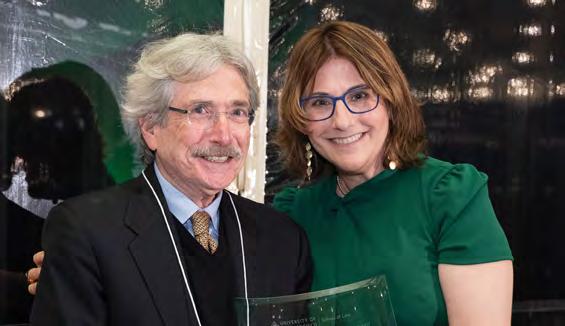
USF Law is shaped and sustained by the care and commitment of alumni and friends who give their time, insight, and support to help our students and community thrive. We're thrilled to recognize this year's alumni award recipients, whose extraordinary contributions have made a lasting impact.
Gary Scholick ’74
Donald L. Carano '59 Alumni of the Year Award
Michael Woo ’82
John J. Meehan '59 Alumni Fellow Award
David Weiss ’90 the Hon. Saundra Brown Armstrong '77 Alumni Award
Calla Yee ’15 Rising Star Award
Murphy, Pearson, Bradley & Feeney Law Firm of the Year Award
Jessica Hartzell was promoted to senior director of operations at TomKat Ranch Educational Foundation. She was also named planning commissioner for Monterey County District 5.
Chelsea Jehle joined Amazon as a compliance specialist, Amazon RISC Legal.
Virginia Taylor joined Safe and Sound, a not-for-profit organization dedicated to preventing child abuse and strengthening families, as a senior policy advisor.
Ray Lei Zhao, LLM, senior partner, head of international trademarks team with Unitalen Attorneys at Law, was awarded Trademark Law Expert of the Year in China by Leaders in Law.
Evan Lebon joined Armada, the San Francisco-based edge computing company, as head of legal.
Jeannie Roebuck Liu joined Salesforce as corporate counsel.
Sarah Van Culin, a senior associate with Zelle LLP, joined the board of directors for the East Bay Children’s Law Offices.
Mark Desrosiers joined Meyers Nave as a senior associate in the firm’s Los Angeles office.
George Gutierrez, joined Samuelsen, Gonzalez, Valenzuela & Brown LLP as an associate attorney in the firm’s San Diego office.
Lana Nassar joined Constangy, Brooks, Smith and Prophete as a senior counsel in the firm’s San Diego office.
Shauna Madison was named a recipient of the ABA’s "On the Rise—Top 40 Young Lawyers" Award.
Lilly McKenna was elevated to partner with Stoel Rives LLP in the firm’s San Francisco office.
Daniel Porter joined Mercer Advisors as a senior estate planning strategist in the firm’s San Francisco office.
Harshavardhan Raja , LLM, was elevated to associate manager—legal, corporate counsel with Sutherland.
Raymond Rollan received a Best Under 40 Award from the National Asian Pacific American Bar Association.
’15
Ida Araya joined Tiffany & Bosco, P.A. as an associate attorney in the firm’s Phoenix office.
Claudia Garcia started a new position as senior director and counsel, commercial legal affairs at Exelixis.
Michael Hewitt was elevated to partner at Sideman & Bancroft LLP.
Simon Levy joined Frost Brown Todd as a partner in the firm’s Business and Commercial Litigation Practice Group in San Francisco.
Magdalena Ridley McQuilla was elevated to shareholder at North Bay law firm, Geary, Shea, O’Donnell, Grattan & Mitchell.
Nicole Phillips joined Alta Employment Law as an attorney investigator.
Sarah Thompson graduated summa cum laude from Lewis and Clark Law School with an LLM in Animal Law.
Shounak Dharap, a partner with Arns Davis Law, led the team that won a nationwide class action suit against Botanic Tonics.
David Saldutti joined Gordon Rees Scully Mansukhani, LLP as a partner in the firm’s San Francisco office.
Ariel Vento joined Andrus Anderson LLP as an associate attorney in the firm’s San Francisco office.
Andrea Lovrincevic joined DeLacey, Riebel & Shindell, LLP as an associate attorney.
Jonathan Harriman ’07 is on a mission to change how young people view the legal profession.
For more than 15 years, he has volunteered with Balboa High School’s Law Academy, working to dispel myths and educate students about what it means to be a lawyer.
“Based on TV and movies, people think we are constantly in the courtroom arguing and objecting in front of a judge and jury. I think it’s really important to help students see that there are a lot of different paths in the law. If you are a strong researcher or writer, that is going to make you a much better lawyer than simply being loud.”
A personal injury attorney, Harriman says he chose USF Law in large part because of its culture of giving back to the community. This ethos inspired him to help high school students learn about the day-to-day work of an attorney. “You have to think how many people helped me along the way. How many people took time out of their day to guide me when I needed guidance?”
At the start of each school year, the Law Academy kicks off with a panel discussion featuring Harriman and other mentors, including fellow alumni Allison Wang ’05 and Neha Nayak ’24. They share with students their experiences in law school, the twists and turns of their careers, and what it’s really like to work in the legal field. Each mentor is then paired with a group of six or seven students, guiding them throughout the school year.
“You get to know these students really well,” Harriman says. “Over the course of the program, you learn about their interests, answer their questions, and help them think critically about their studies.”
In the spring, students dive into a hands-on project, tackling a real-world issue in their community. “One group, for example, looked at homelessness in San Francisco,” Harriman shares. “It’s an issue that the students recognize is a big problem. They examined the legal constraints and explored potential solutions … what we can do as a city, as a government, and as a community to address this issue.”
Harriman hopes more lawyers will get involved with the Law Academy as mentors. “The time commitment for a mentor is about two hours, once a week, for sixteen weeks a year,” he says. “We want lawyers who can show the students that you can go into the law no matter what background you come from. And we want mentors who are litigators, criminal attorneys, big firm lawyers, small firm lawyers, government lawyers, judges, and retired lawyers. The more perspectives we can offer, the better equipped these students will be to understand the possibilities in a legal career.”
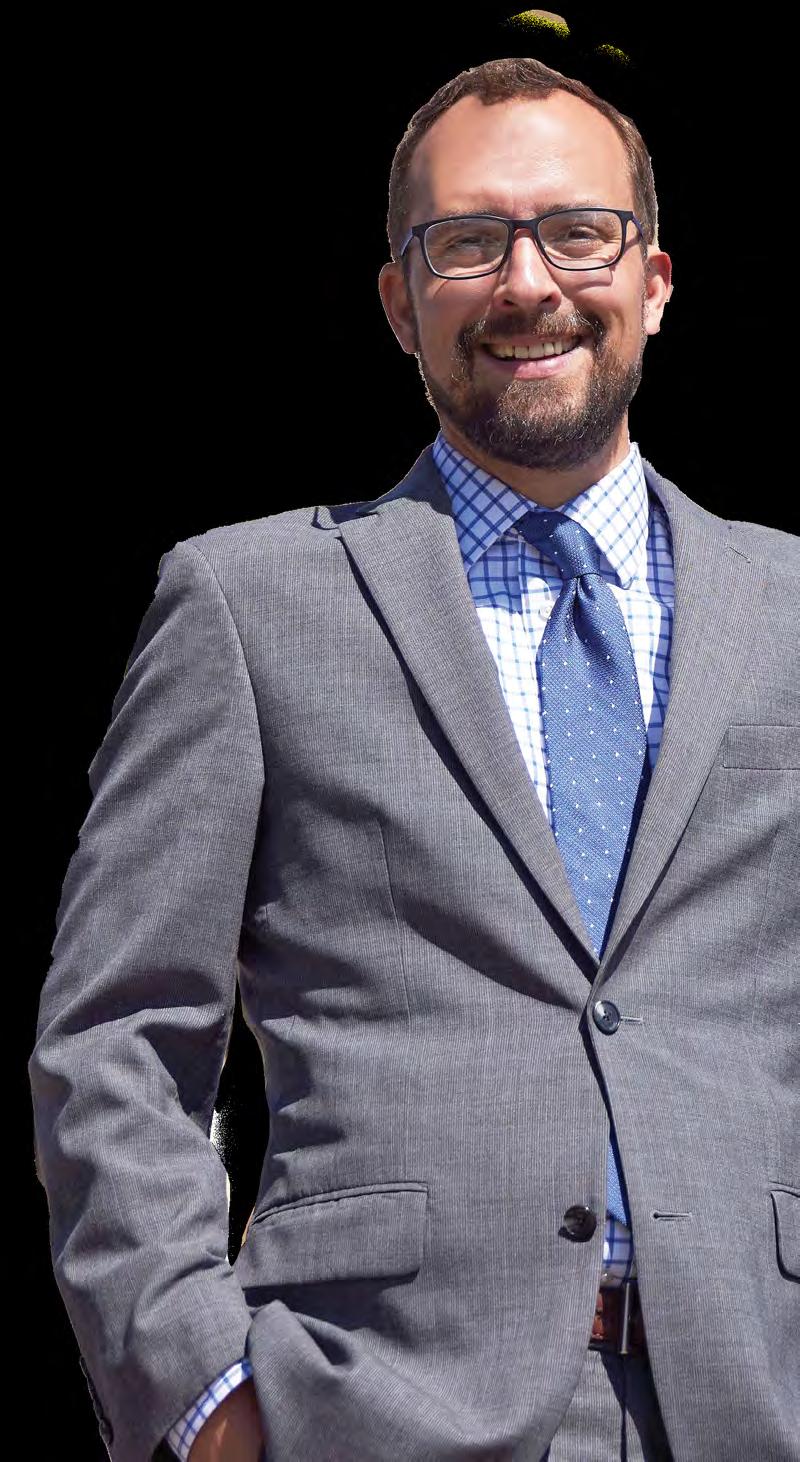
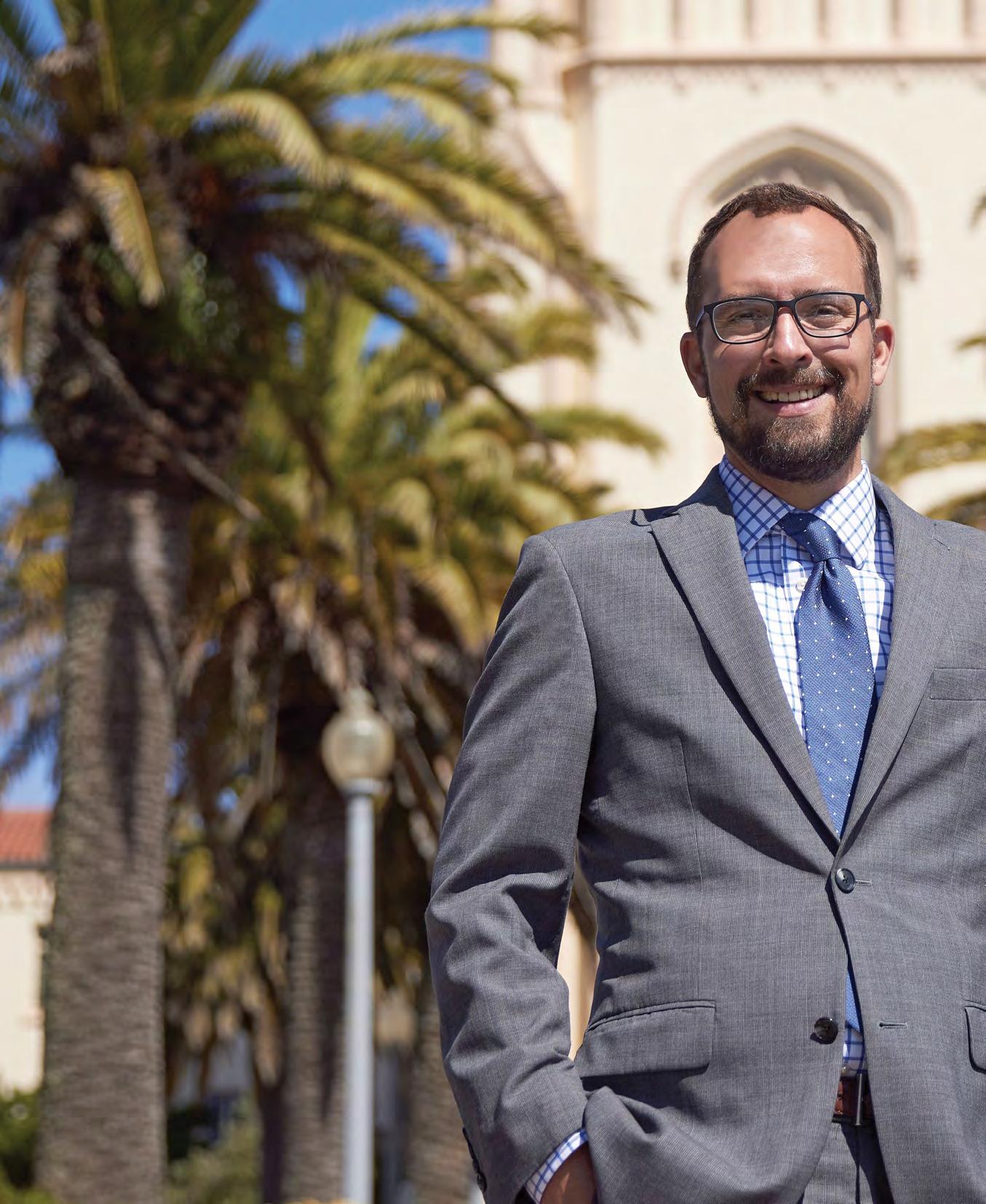
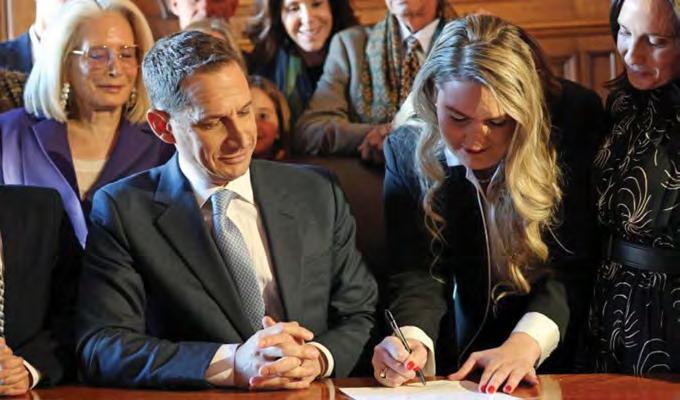
As a young paralegal just out of college, Jessie Peterson ’21 never would have predicted she’d take center stage the day San Francisco welcomed its first new mayor since 2018.
Peterson, an associate deputy state public defender who works on death penalty appellate cases, officiated San Francisco Mayor Daniel Lurie’s January swearing-in ceremony.
Peterson first came to Lurie’s attention when she was an undergraduate at San Francisco State. She was part of the Guardian Scholars Program (GSP), which helps current or former foster youth get into college and graduate. When Lurie’s nonprofit, Tipping Point, made a donation 14 years ago in support of GSP, Peterson was selected to accept the gift on the program’s behalf.
While she was at San Francisco State, Peterson sat in on a constitutional law class at USF School of Law taught by Professor Julie Nice.
“It was then I knew USF was where I wanted to attend law school,” Peterson said. “I just felt like I belonged there.”
When, after her third try, she was admitted to USF Law, Peterson earned straight As, participated in the Racial Justice Clinic and Criminal and Juvenile Justice Clinic, was a member of the academic support program, and served as the chair of the Public Interest Law Foundation and the editor in chief of the law review.
“As a law student, Jessie's leadership skills and passion for justice were evident in everything she did,” said Stephanie Carlos, assistant dean for student affairs.
Peterson said her work with the clinics inspired her current practice. “I got to represent people in superior court through the CJJC, and work with and advocate on behalf of clients inside the jails at the S.F. Public Defender’s Office as part of the RJC,” she said. “The real-life, hands-on experience prepared me to become a competent public defender.”
Today, Peterson represents clients in their felony criminal appeals in the California Court of Appeal and California Supreme Court.
“It’s my dream job,” she said. “I feel incredibly honored every single day to do this work. I get to call out the injustices in our unjust criminal legal system, and represent the most disadvantaged, forgotten about people in our society.”
After last November's mayoral election, Lurie’s team called Peterson. They wanted to have a different type of inauguration, and part of that meant eschewing having a governor or attorney general administer the oath of office. They wanted a San Franciscan, someone to whom Lurie would be accountable.
Asked about her long-term goals, Peterson said, “My goal every day is to learn more and be a better lawyer and advocate. Right now, I am focused on doing that.” n
Erica Roth was elected to the Nevada State Assembly representing the 24th district.
Laila Rahimi-Keshari was elevated to partner with Foley Mansfield.
Carol Nguyen started a new position as tax project management driver with PwC.
Has S. Jawandha opened Jawandha Injury Law, a personal injury firm.
Jennifer Nguyen joined Netflix as a contracts specialist, business and legal affairs.
Meghan O’Keefe was elevated to senior attorney with Corporate Immigration Partners.
Henry Trinh joined Bluerock Capital Markets LLC as a compliance associate.
Alyssa Daatio started a new position as an associate attorney at Bay Area Probate & Estate Law.
Dayna Louie was promoted to senior counsel with Hansen Bridgett LLP.
Ryan Louie Manuel, an attorney with Lewis Brisbois, was named to the SuperLawyers list of top rated personal injury attorneys.
Ernie D. Mejia was promoted to senior counsel with Gordon Rees Scully Mansukhani, LLP.
Chekwume Ufoegbune joined Wilson Elser as attorney at law.
Ian Wright, MLST, was elevated to director with Jefferson, Urian, Doane & Sterner, PA.
’20
Kaligh Jones started a new position as real estate and securities attorney with Kilpatrick Townsend & Stockton LLP.
’21
Isaac Arreola joined Adler Law Group, APLC, as an associate attorney.
Jennifer Fair joined Gordon Rees Scully Mansukhani, LLP as an associate attorney.
Nicole Gorney started a new position as a supervising attorneyat Vital Immigrant Defense Advocacy and Services (VIDAS).
Ashar Philson joined Gordon Rees Scully Mansukhani, LLP as an associate attorney.
Marisa Sanchez joined Taylor Anderson LLP as an associate attorney.
Sallia Wilkins joined Gordon Rees Scully Mansukhani, LLP as a labor and employment attorney.
’22
Victor Adame joined the Law Offices of Dominic E. Capeci as an associate attorney.
Chauncey McNeill joined Quintairos, Prieto, Wood, & Boyer, P.A. as a litigation attorney in the firm’s Bay Area office.
Adriana Valdez joined Wood, Smith, Henning, and Berman as an associate in the firm’s Petaluma, California, office.
Kenneth Lovette BA ‘62, JD ‘66
June 2025
Donald Albach ’67
November 2024
Gary R. Spratling ’71 March 2025
George Beckwith ’73 November 2024
Thomas Anthony Durkin ‘73
July 2025
Harvey J. Anderson II ’92 December 2024
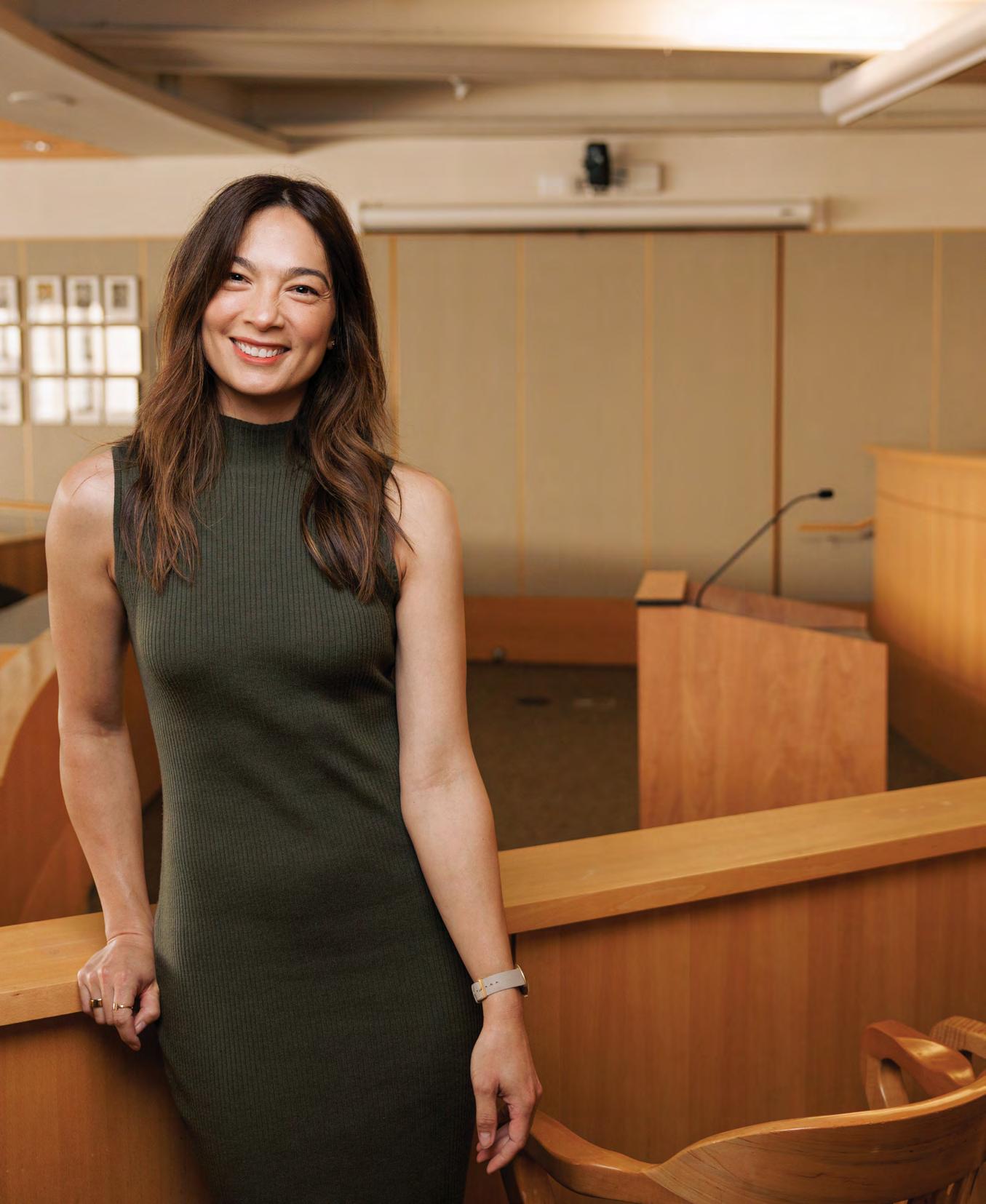
USF Law gave me more than a degree, it gave me a community. The Moot Court Program helped me find my voice and gave me a launchpad. Staying connected as an adjunct, mentor, and Board member allows me to give back and help shape the next generation of advocates.”
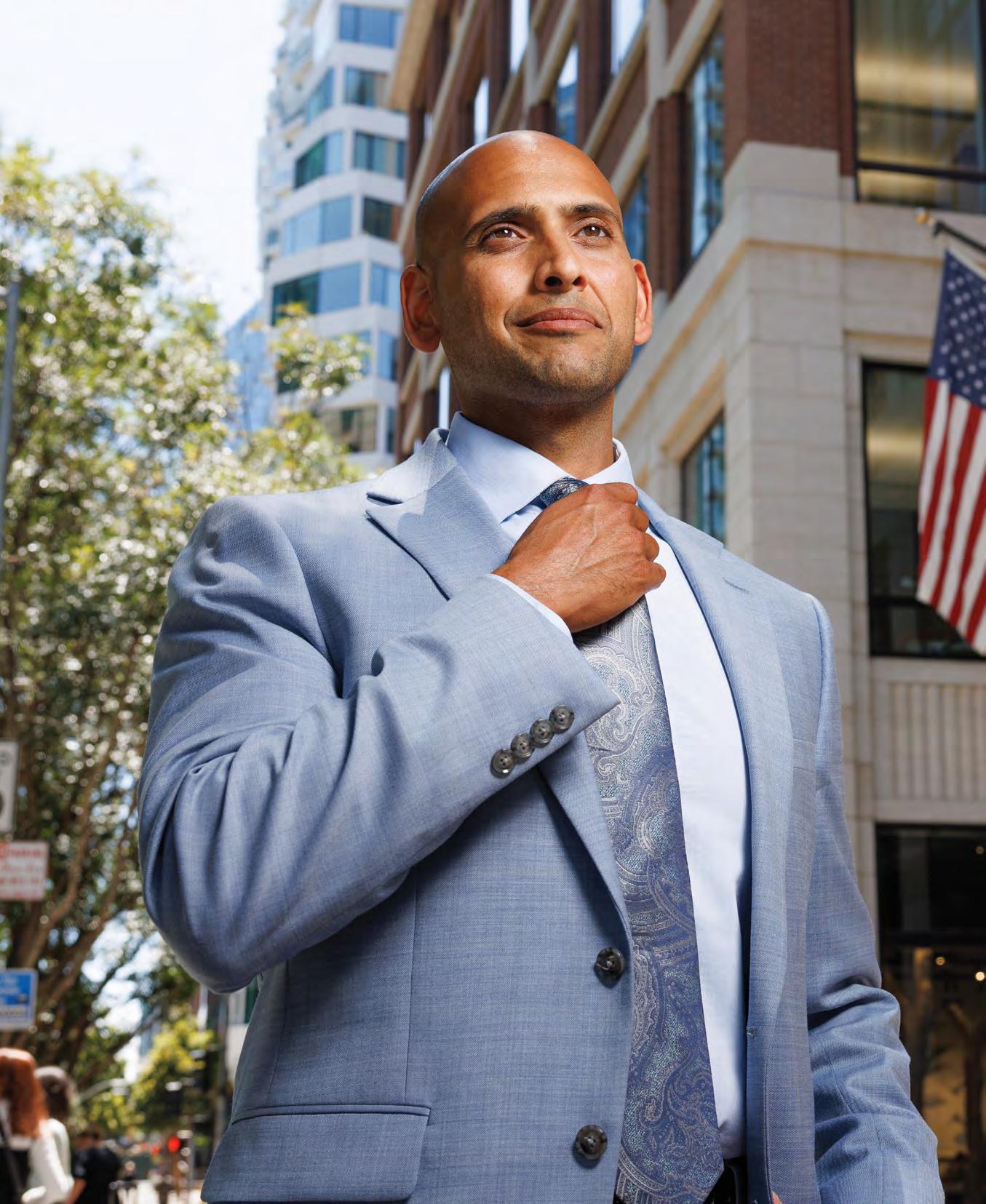
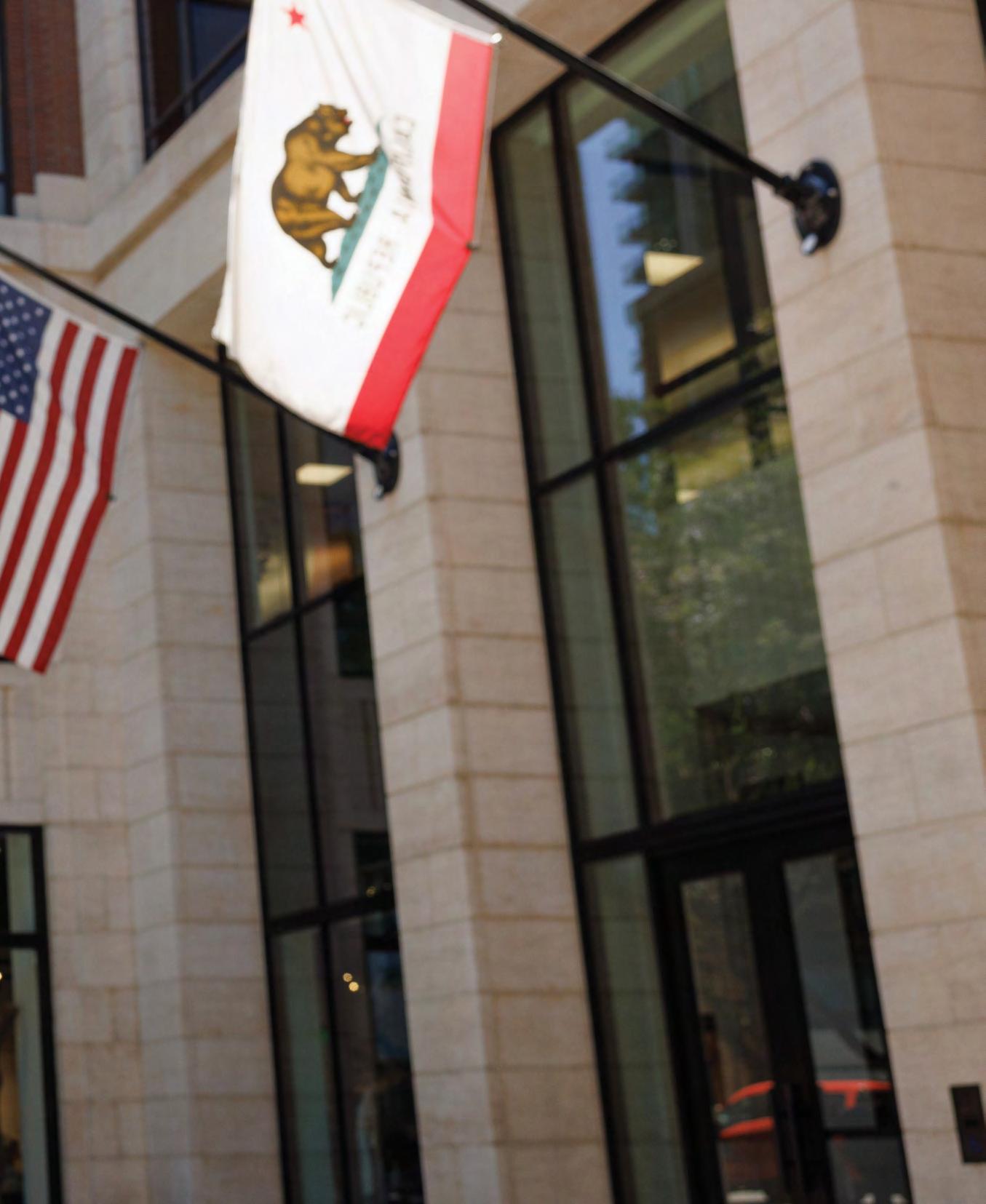
By Shounak S. Dharap ‘16
I’ve always loved Superman. Especially as an anxious, unathletic 10-year-old with an unpronounceable name, buying armfuls of comics from the discount bin and reading them until the pages fell apart. Superman fought to protect those who couldn’t protect themselves. He embodied the relentless pursuit of ideals in the face of insurmountable odds. Truth, justice, and the American way! Those concepts were glamorous fictions to a first-generation American whose parents hadn’t grown up steeped in a cultural mythology that romanticized the fight for what’s right.
For my parents, the ideals were work hard, keep your head down, don’t cause trouble. Most people share those. They’re good ones.
But not for lawyers.
Professor Travis ended my 1L torts class by giving each budding lawyer a small plastic key, telling us tour skillset is a powerful tool and our task is to find the door it opens. “You have power,” she said. “Find the right way to use it.” I knew I wouldn’t do that by keeping my head down.
Still, it was easier said than done. My first few years as a lawyer were less “leaping tall buildings in a single bound” and more bounding headlong into the sides of those buildings. I learned fast that no case goes smoothly. Opponents move to dismiss, depositions go sideways, evidence undermines the case, and legal barriers loom large. But fly hard enough into any wall, and eventually you’re bound to break through.
Over nearly a decade of practice, I’ve increasingly embraced the barriers, focusing my practice on the “impossible” cases— where the injustice is obvious but the means to redress are not. Some involve huge numbers of people harmed in the same way, like a nationwide class action involving an energy drink that actually contained an opioid. Others involve issues of first impression, like arguing that certain gig workers were exempt from forced arbitration because their work put them in the same category as railroad workers from the early 1900s.
Sometimes these cases require a pioneering use of brandnew laws, like filing one of the very first lawsuits under California’s newly enacted Doxing Victims Recourse Act when a defendant publicly outed my pseudonymous clients’ identities in a sexual assault case. And sometimes they involve situations where the law seems to foreclose justice entirely— like the women with institutional abuse claims blocked by a decade-old statute of limitations, for whom we recovered millions of dollars and an apology.
You’d think that after seeing the myriad ways people are hurt and taken advantage of, I’d have grown cynical. Especially now, with the rule of law bending under political pressure and lawyers becoming targets of the system they’ve sworn to uphold.
Yet after nine years of “impossible” cases, I’ve learned that hope is more than a comic book ideal. It’s the currency of justice. It’s the IOU we give our clients for the torturous journey of protracted litigation. And to give it away to so many so often, it is a mathematical certainty that we keep a limitless supply.
Now other lawyers seek me out for the cases they can’t nail down: the tough situations, where something is clearly wrong, but they can’t figure out how to help. When I get those calls, I’m once again the kid flipping open his latest dog-eared comic book; but now I’m also the one on the cover. So I lean in.
Embrace the impossible situations. Build the muscle memory. Take the hard case, make the stretch argument, and treat every setback as an opportunity to head in a better direction. Do it because that’s the best way to lawyer. More than that, do it so that when doors get slammed in the faces of the people who need us most, you can stand up and break them down.
It turns out the plastic key I got all those years ago wasn’t a key after all. It was a sledgehammer. n
Shounak Dharap is a partner with Arns Davis Law
The Koret Law Center 2130 Fulton Street
San Francisco, CA 94117-1080
CHANGE SERVICE REQUESTED
